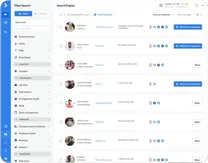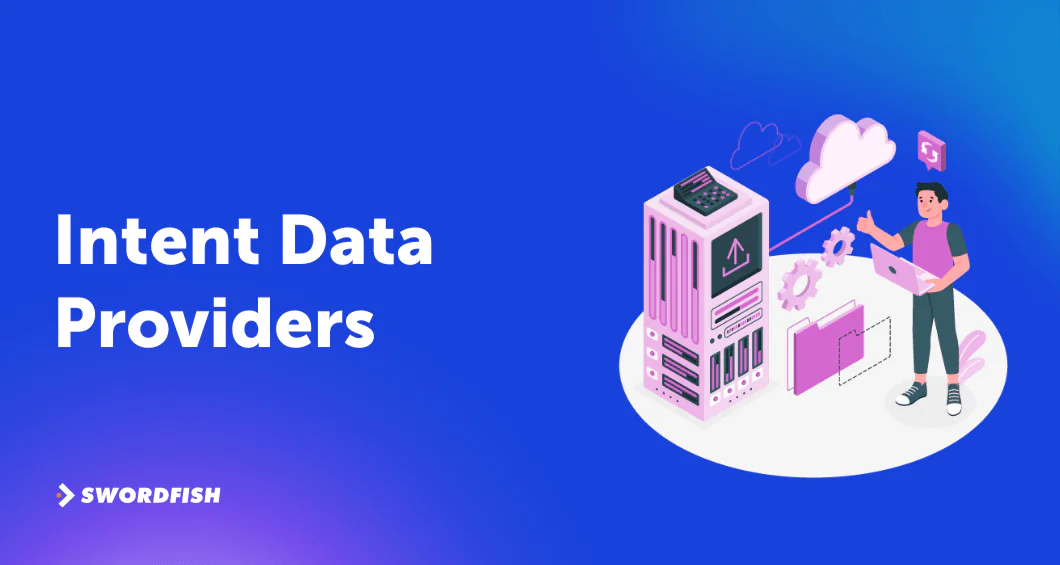
If you’re searching for new clients, intent data is the thing you need. These data can identify businesses that may need your products even before they reach out to you. By using this data, you can focus your efforts where they’re most likely to pay off.
However, remember, not all intent data is the same. Its quality and accuracy can vary greatly, depending on the provider’s data collection methods.
For successful sales and marketing, you have to pick the right intent data provider. In fact, using unreliable data can waste your time and energy on leads that won’t convert.
That’s why it’s important to understand what to look for when choosing intent data providers. We’ll guide you through how top providers generate and verify their data quality, and how you can benefit from it.
So, read on!!
What is Intent Data?
Intent data is information collected to understand a potential buyer’s purchase intent based on their online behavior. It includes insights from activities such as website visits, content downloads, and search queries.
According to InboxInsight, 26% of B2B marketers use their own data, 19% use data from outside sources, and 55% use a mix of both.
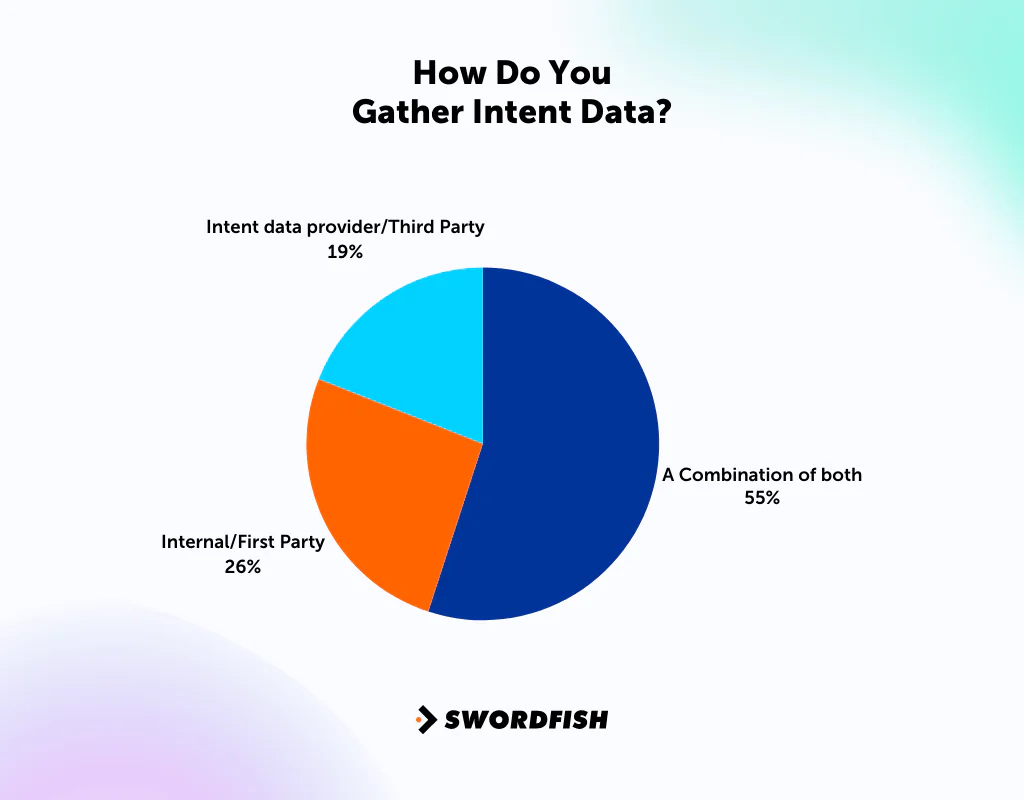
These hints can be the websites they visit, the content they read, and the keywords they search for, or their social media activity. However, HubSpot found that 61% of these marketers struggle to get traffic and leads.
So, buyer intent data providers gather these hints to offer valuable insights about a buyer’s intentions. When you understand these insights, you’re in a better position to secure more deals.
But remember, just because someone wants to buy doesn’t mean they can. That’s why many providers combine intent data with other details, like company information and technology usage, to give a complete view.
There are different kinds of intent data, each with its strengths and weaknesses:
- First-party intent data: This comes from your own sources, like your website or social media. It tracks how leads interact with your brand, helping you gauge their interest.
- Second-party intent data: Data that you purchase from another company. It might come from places like review sites, such as TrustRadius or G2.
- Third-party intent data: This data is collected by external vendors from various online sources. They process and organize it to give you a broad view of what your potential customers are interested in.
Quick List of Best Intent Data Providers
Choosing the right intent data provider can be challenging. Here’s an easy-to-follow guide to find the best option for your needs —
- Swordfish AI: Best for merging phone and email searches with Bombora’s data.
- Bombora: Best for comprehensive, privacy-compliant B2B intent data insights.
- Lusha: Best for connecting with decision-makers based on their solution search.
- ZoomInfo: Best for using real-time buyer data for focused outreach.
- Demandbase: Best for international B2B intent data with campaign insights.
- 6sense: Best for comprehensive B2B data and future trend predictions.
- DemandScience: Best for varied intent data centered on clear buying indicators.
- Dealfront: Best for spotting potential customers showing immediate interest.
- Lead Onion: Best for sales engagement powered by up-to-date intent data.
- Terminus: Best for marketing strategies based on account-specific intent data.
Top Intent Data Provider Comparison Chart
When looking at different intent data providers, it’s important to know what each one brings to the table. This chart compares several top providers, focusing on their main features and the kind of data they offer.
Intent Data Providers | Database | Real-Time Data & Accuracy | Intent Data |
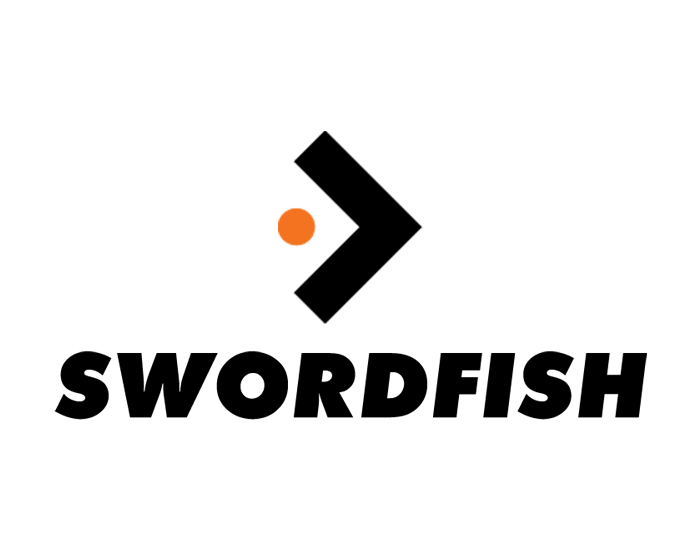 | 3.5 billion data profiles | Real-time line connectivity validation | Bombora Intent Data |
 | 4 million average unique domains | Measures prospects’ digital journey | Quality data from the Intent data Co-op |
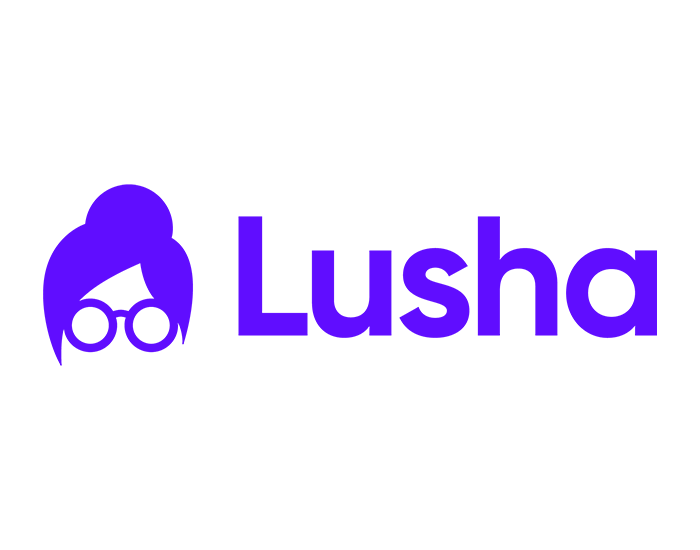 | 50 million enterprise business profilesn total records | High data accuracy | Company-Level Intent Scores |
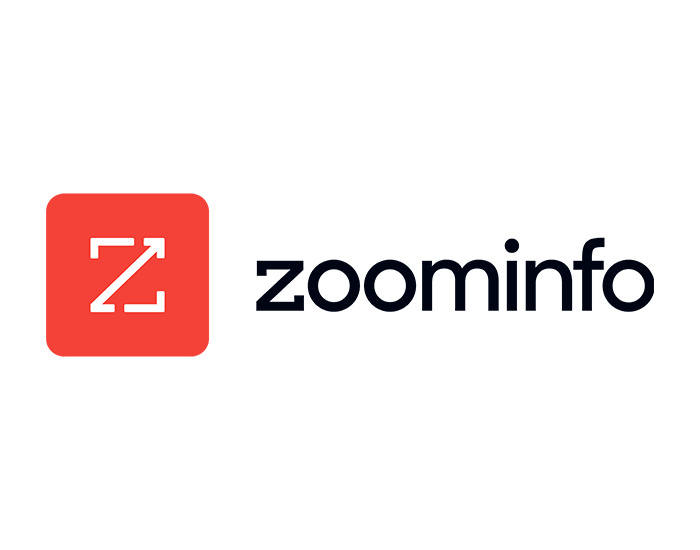 | Over 135 million verified phone numbers and 260 million professional profiles | Advanced search and filtering options history | Streaming Buyer Intent Data |
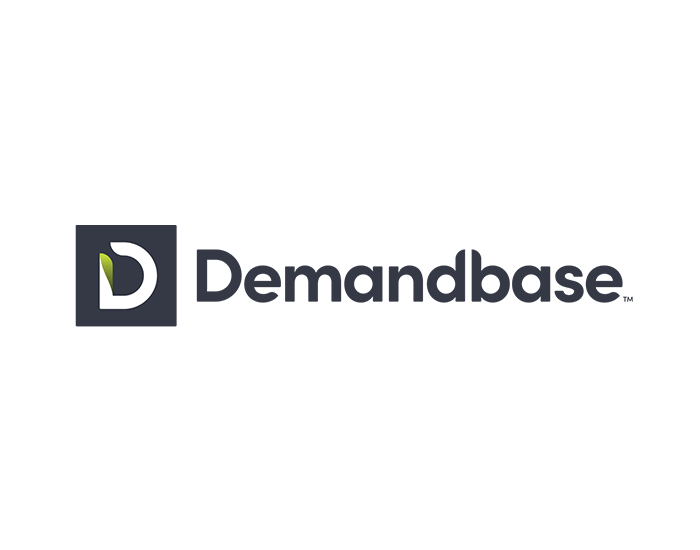 | Over 50 million B2B contacts | ABM/ABX for targeted marketing | Global B2B Buyer Intent Data |
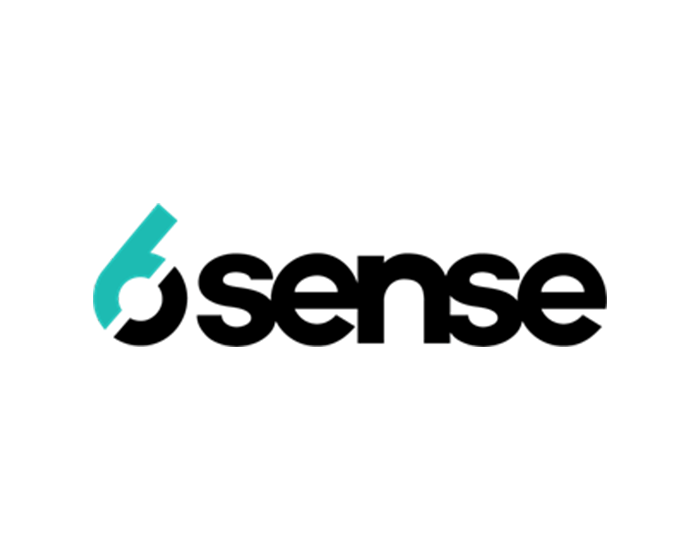 | Over 415 million B2B buyer profiles published | Predictive analytics for buying stages | Predictive Models |
 | Over 570 million contact records updated | Content Syndication for lead generation | Multi-Source Intent |
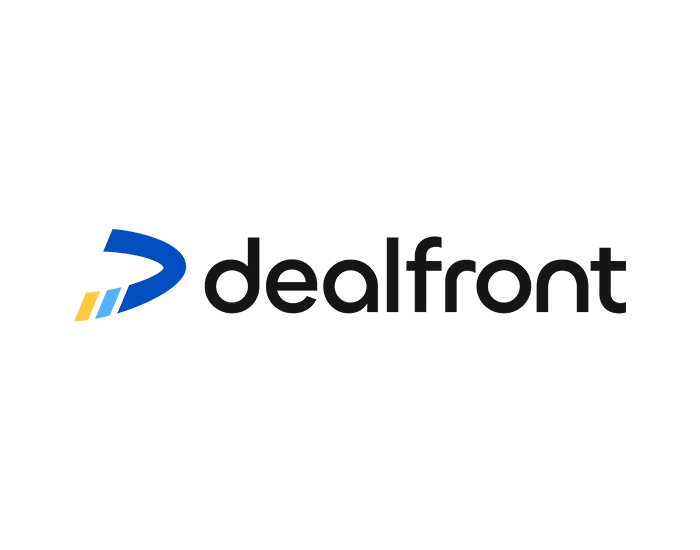 | In Europe over 83 million contacts and in the USA and the Rest of the World over 145 million contacts | Sales Intelligence for lead generation | Website Activity Tracking |
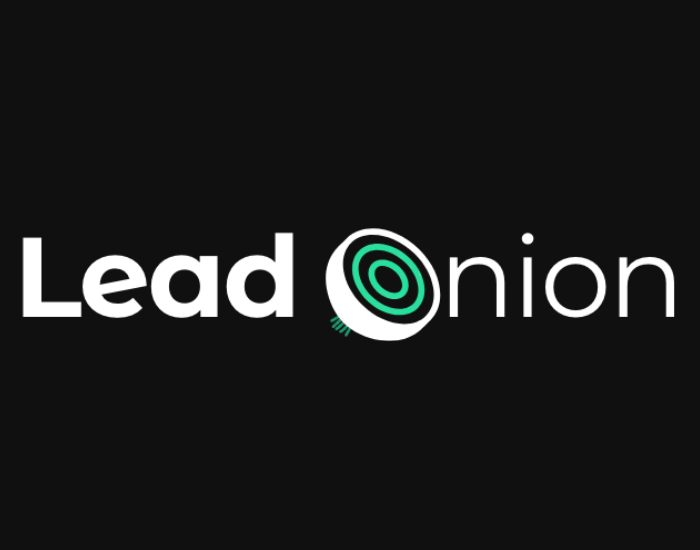 | 117 million contact profiles | Intent-driven sales engagement platform | Buyer intent B2B data |
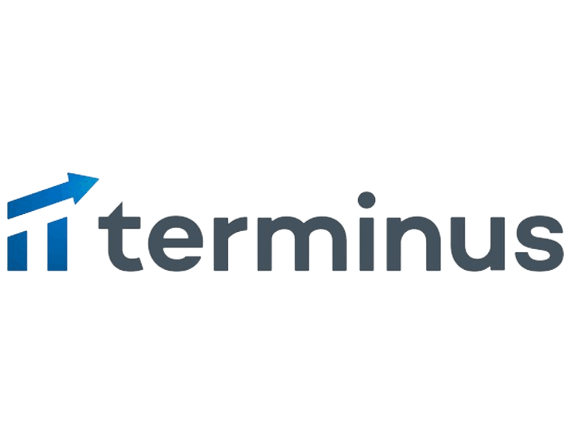 | B2B data with account-based marketing focus | Multi-channel engagement strategies | First-party relationship data |
10 Top Intent Data Providers to Increase Your Business ROI
With so many choices out there, finding the right one can be tough. We’ve made a list of the top 10 providers that help improve profits.
While shortlisting them, we analyzed the quality of their intent data, their sources, and quantity. Plus, we also looked for other features like real-time validation, extension, and CRM integration.
So, check them out to find the best match for your needs.
1. Swordfish AI
Swordfish AI stands out as a prominent intent data provider, helping businesses find both B2B and B2C intent data. The platform is designed to scan social media profiles of professionals, ensuring real-time accuracy in its findings.
We have a unique cell phone number and a proprietary cell phone verification system. Furthermore, with access to over 3.5 billion data profiles, Swordfish ensures a vast reach.
Moreover, Swordfish AI uses its own algorithms to ensure that contact information is accurate and current. By using the tool, you can schedule more meetings, save time finding contacts, and enhance your work efficiency.
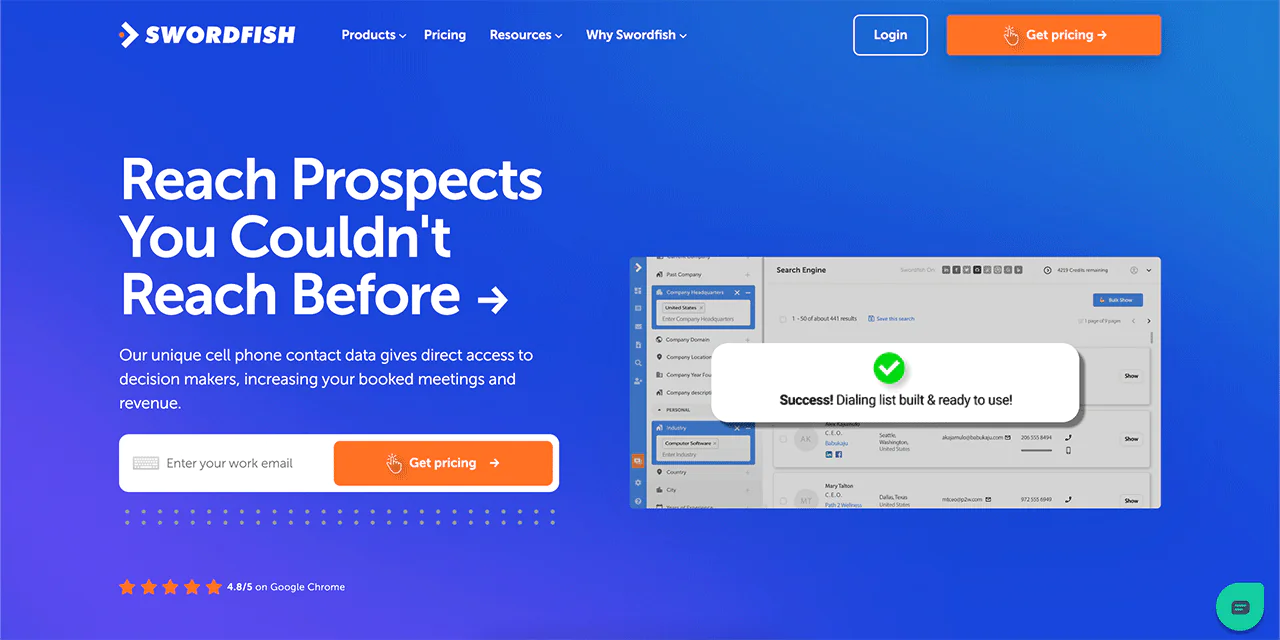
About Swordfish
- Founding year: 2015
- Founding team: Ben Argeband
- Company Size: 11 to 50 employees
Features of Swordfish AI
Swordfish AI is equipped with several features that improve the way you collect and handle contact information. Let’s explore these features —
-
Bombora® Intent Data
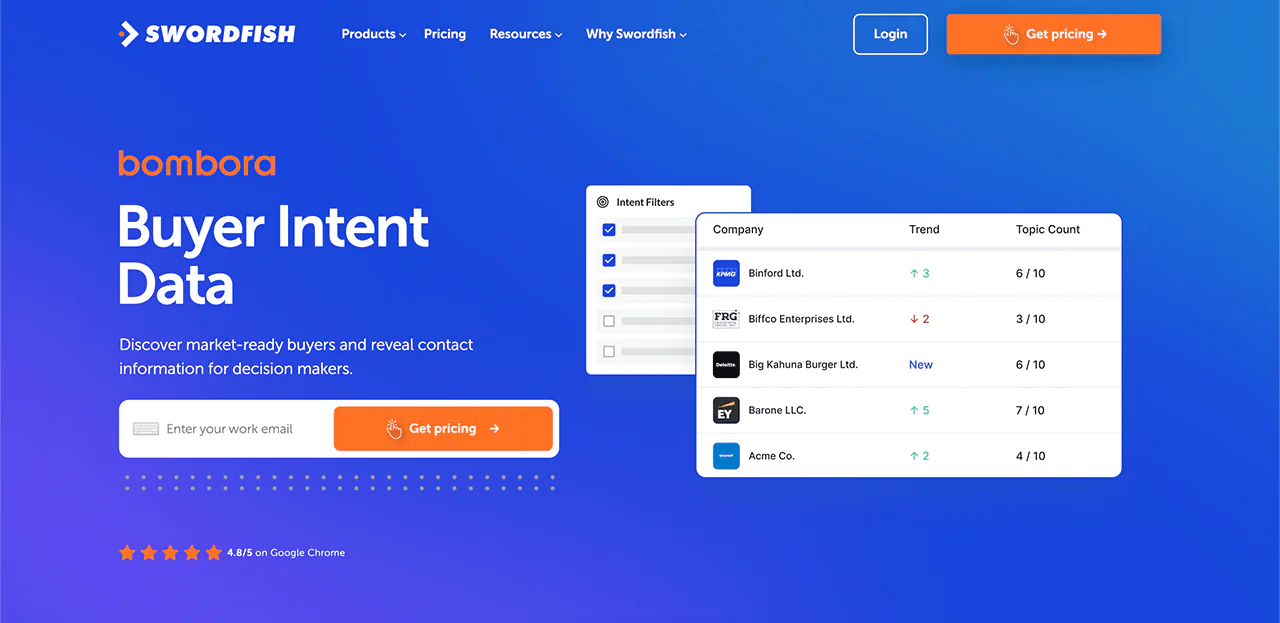
This tool uses information from Bombora intent data to pinpoint businesses that are ready to interact or buy something. It’s great for focusing your marketing efforts and reaching out more effectively.
-
Chrome Extension
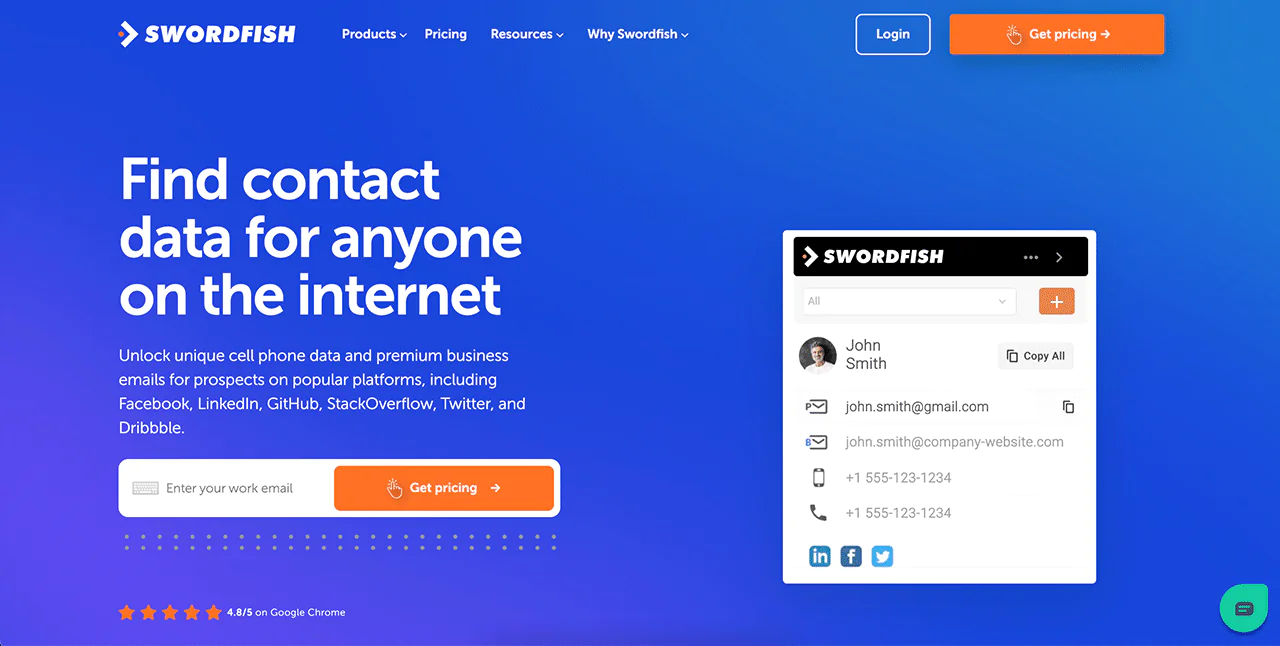
The Chrome extension makes it easy to find people’s contact details on different websites. It’s handy for anyone who needs to quickly gather this information while surfing the internet.
-
Prospector
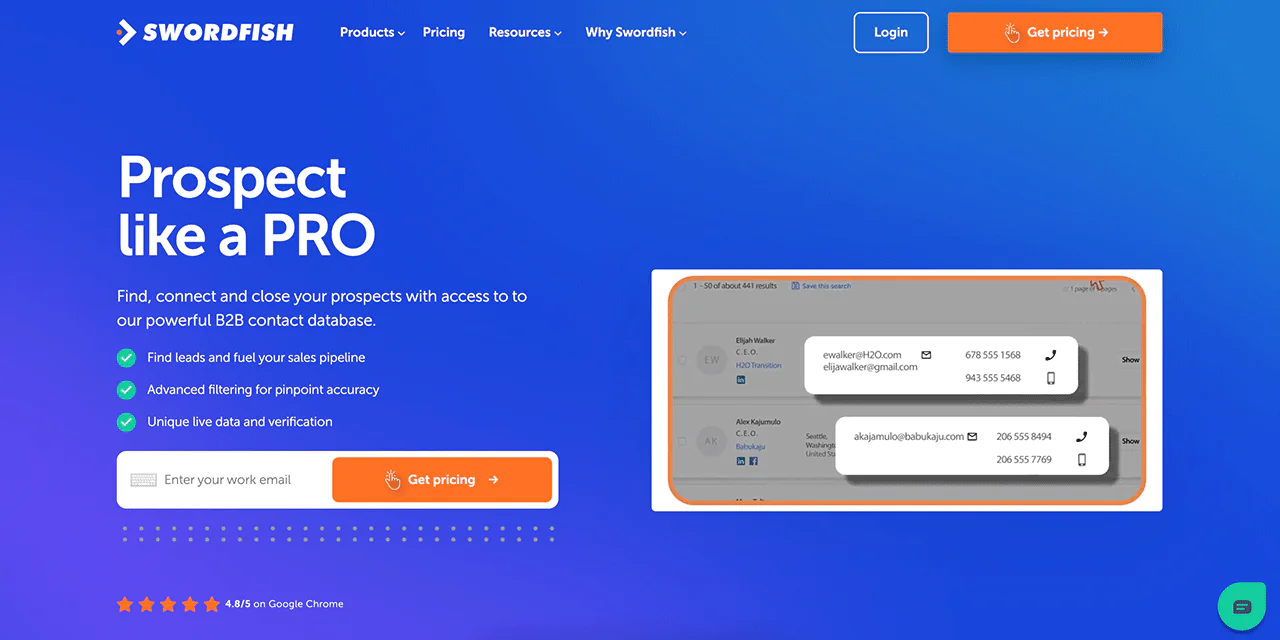
Prospector helps you create lists for calling and emailing potential leads fast. It uses special filters to make sure these lists are accurate, which is really useful for salespeople who want to make their lead generation process smoother.
-
File Upload
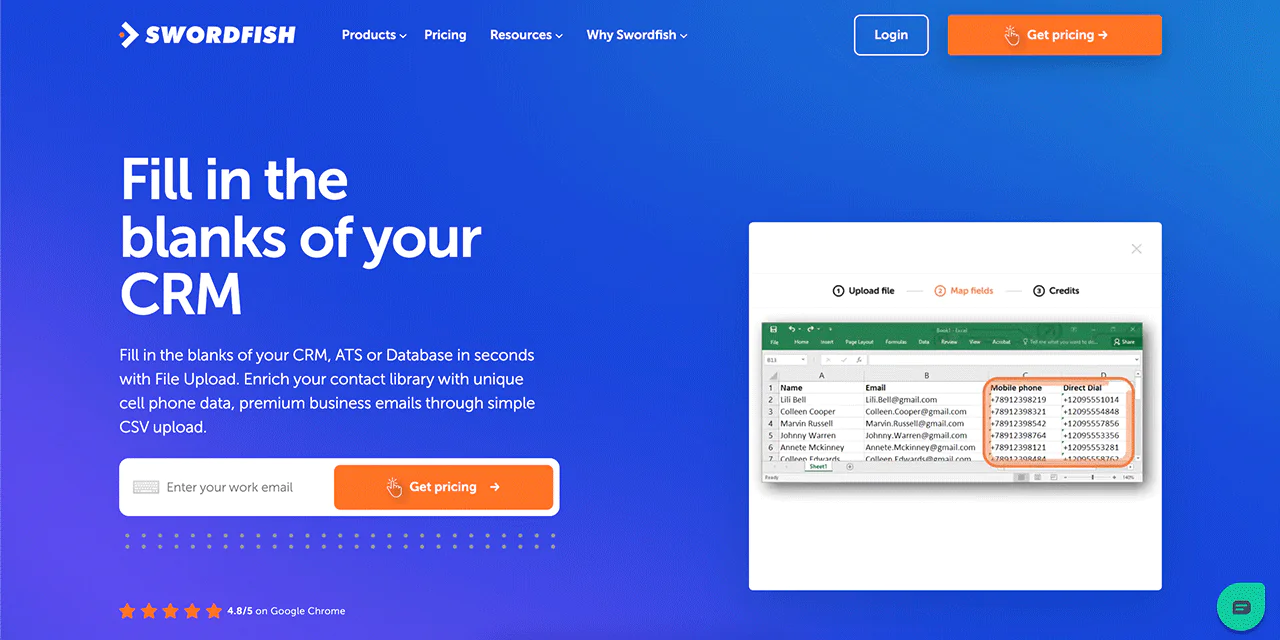
The File Upload lets you improve your CRM database effortlessly. Just upload a CSV file, and Swordfish AI will fill in any missing phone numbers and emails quickly. It saves a lot of time and effort that you would otherwise spend on data entry.
-
Reverse Search
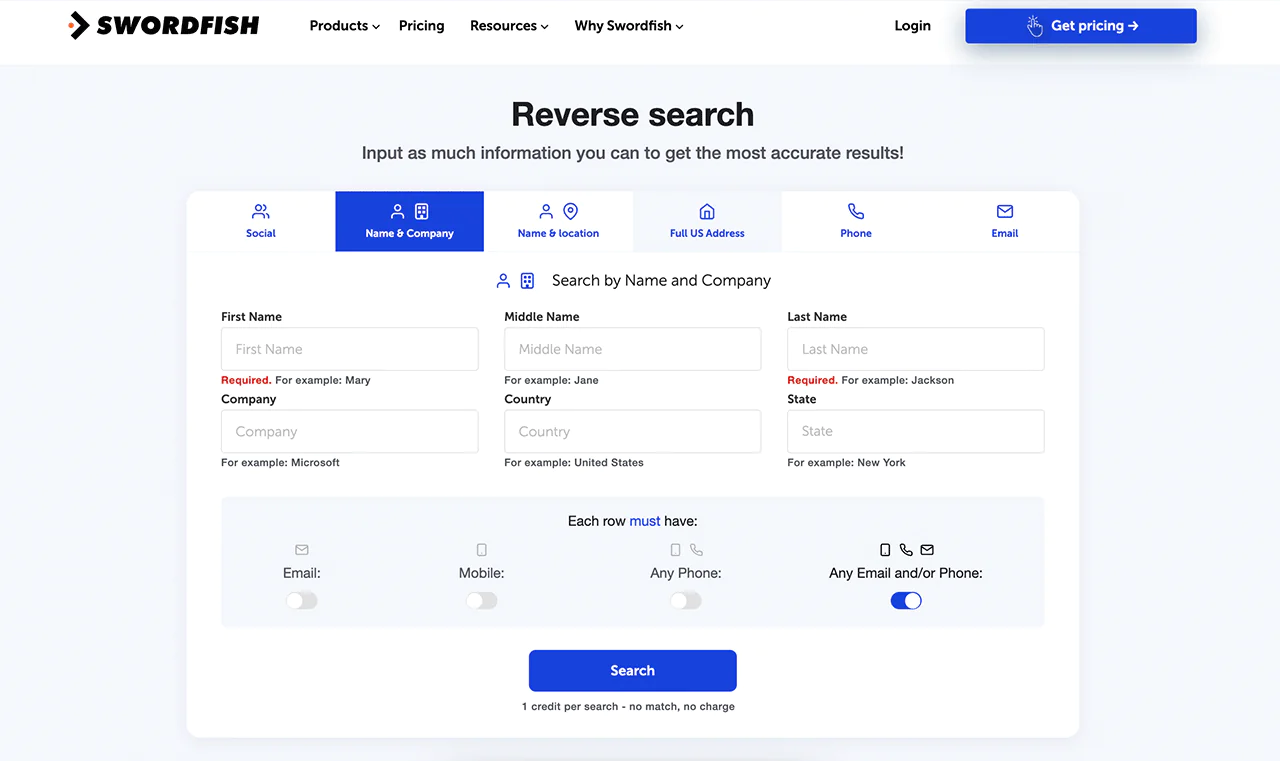
With Reverse Search, you can find detailed contact info using just a few pieces of information like a name or email. Swordfish AI can find all the contact details you need, making it a flexible tool for research and reaching out.
-
API
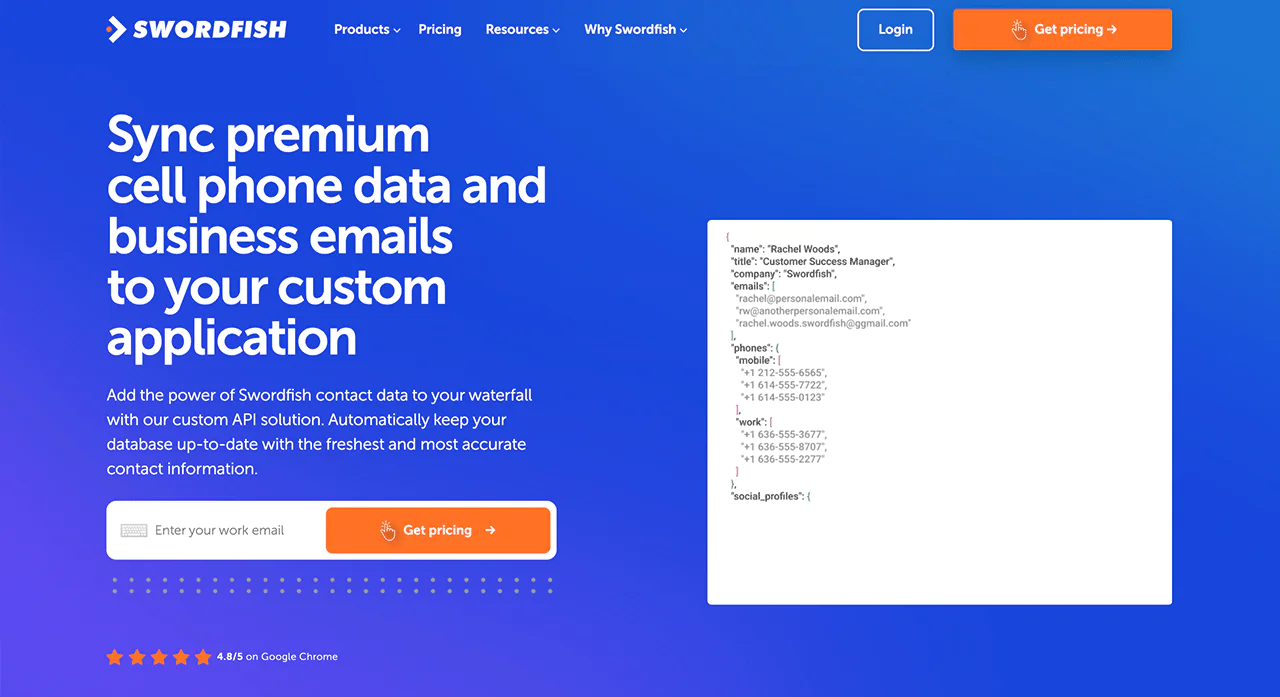
The API integration of Swordfish AI allows you to add unique contact details to different applications. It’s especially helpful for developers and companies who want to include detailed contact information in their own software or systems.
Best Use Cases of Swordfish AI
Swordfish AI is useful in many areas. Here’s a simpler look at what it can do:
- Lead Generation: Swordfish AI’s Intent Data helps in finding businesses that are actively looking into topics related to your products or services. It helps sales teams focus on the right decision-makers who are more likely to be interested in what they’re offering.
- Market Research: Use Bombora Intent Data to get a clear picture of what’s trending in the market and what businesses are interested in. This information is valuable for creating marketing strategies that really hit the mark.
- Enhanced Sales Strategy: For sales professionals, Intent Data is a key tool. It helps them identify businesses that are ready to buy, making their sales efforts both more focused and more successful.
- Personalized Marketing: Marketing teams can use Intent Data to shape their campaigns to meet the specific interests and needs of different companies.
Pros
- Increases booked meetings with unique cell phone data.
- Reduces sourcing time with rapid data retrieval.
- Enhances email campaign success with validated emails.
- Eases lead generation with bulk prospecting tools.
- Improves data accuracy with proprietary matching algorithms.
- Provides on-the-spot data access via Chrome extension.
Cons
- Small businesses may find price quotes challenging
Pricing
Swordfish AI tailors its pricing plans to fit different needs, whether you’re in sales, recruitment, marketing, or need API integration. The exact prices aren’t available online, but you can get a personalized quote based on what you require.
These plans help with everyday tasks such as searching for phone numbers and emails, integrating with CRM systems, and accessing current data. For specific pricing information, it’s best to contact Swordfish AI directly.
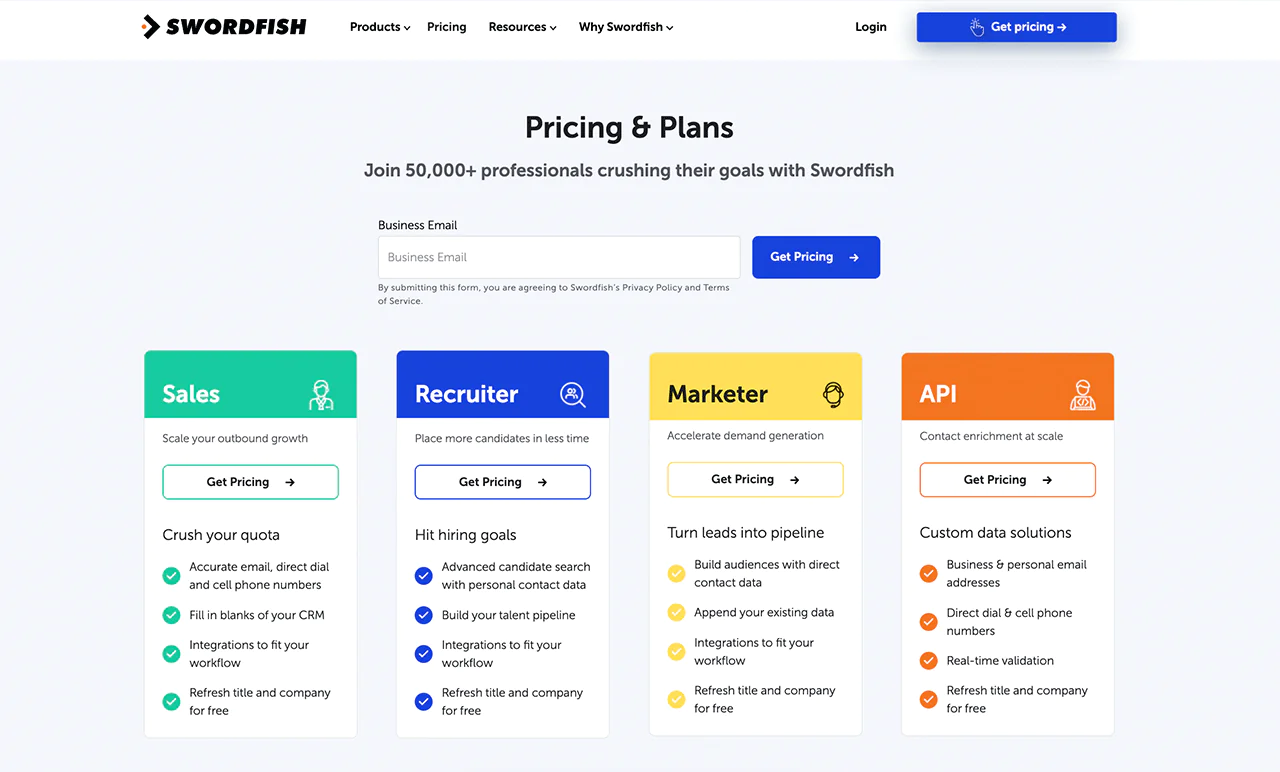
What Users Say About Swordfish AI
- G2: 4.5 · 84 reviews
“The ability to use forensic data to track both leads and suspects that are abusive and a danger to corporates in their capacity and risk” – Chris S.
- Capterra: 4.6 · 12 reviews
“very very good and the best piece of software to use with linkedin” – Uma U.
2. Bombora
Bombora is a top provider of B2B Intent data, known for its detailed and privacy-conscious approach. Their Data Cooperative stands out for being sourced ethically from consent-based websites, which makes it a reliable choice for businesses.
They collect data directly and consensually from users across more than 5,000 leading B2B sites. This gives businesses true insight into a buyer’s digital journey.
This data is valuable in helping businesses understand the level of interest in their products or services. Additionally, Bombora’s data can be easily integrated with all major sales, B2B advertising, and marketing technology platforms.
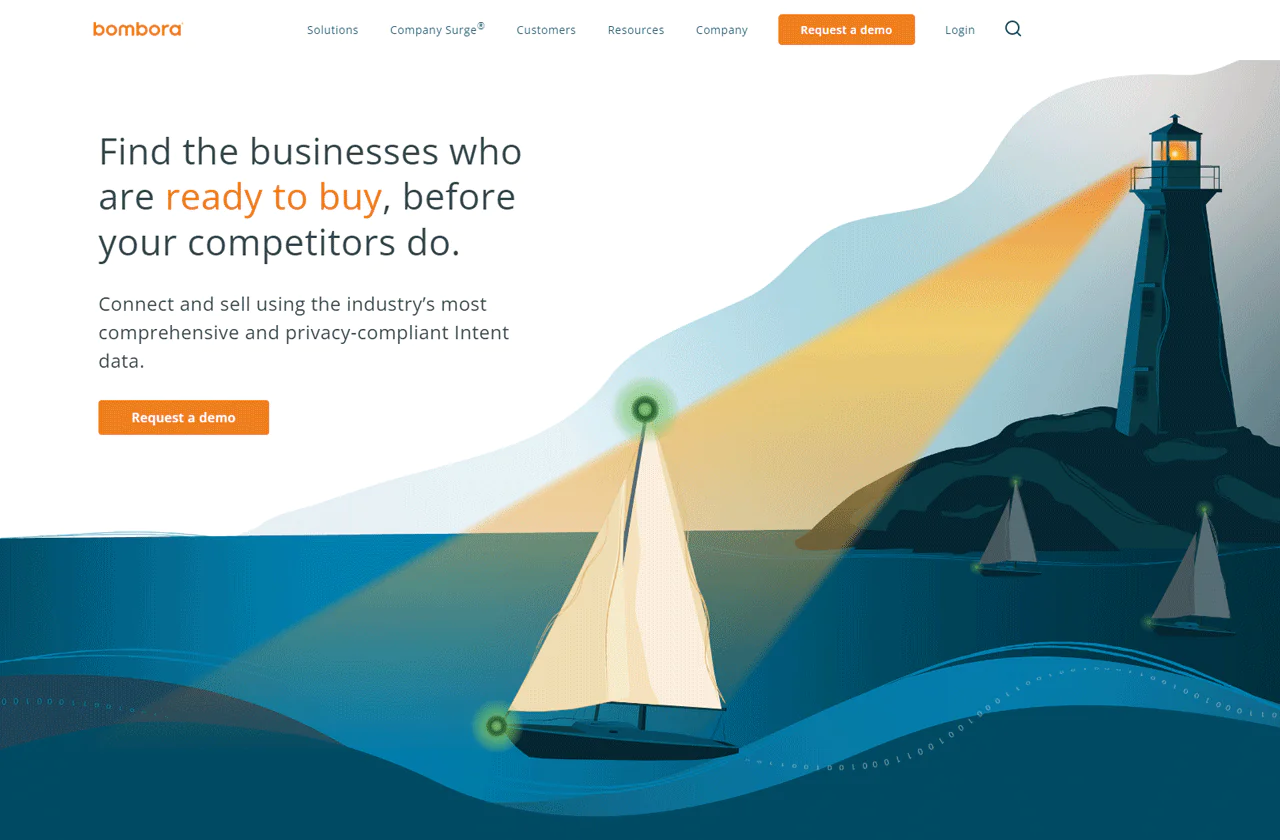
About Bombora
- Founding year: 2014
- Founding team: Erik Matlick
- Company Size: 250 employees
Features of Bombora
Bombora specializes in intent data and B2B marketing tools. Key features include —
- Data Cooperative: Bombora gathers its data from a wide network of B2B publishers, offering a diverse range of market insights.
- Company Surge® Analytics: This tool uses sophisticated technology to analyze web content, giving a clear view of what buyers are interested in.
- Business Identity Mapping: Bombora uses a mix of data types, like behavior and IP information, to identify businesses accurately, enriched with additional business and demographic details.
- Detection of In-Market Intent: Bombora can tell when a company is ready to buy by looking at its online research activities.
- Extensive Topic Taxonomy: Bombora organizes its data into more than 13,000 categories, helping to simplify and clarify buyer interests.
- Integration with Major Platforms: Bombora’s data integrates smoothly with existing B2B systems, improving sales and marketing efforts without hassle.
- Ethically Sourced and Privacy Compliant Data: Bombora responsibly collects data from consented websites, adhering to privacy standards.
Pros
- Broad market insights from a vast B2B publisher network.
- Advanced analytics for accurate buyer interest interpretation.
- Precise business identification enhances targeting accuracy.
- Timely detection of companies ready to purchase.
- Simplifies understanding of buyer interests with extensive taxonomy.
Cons
- The reports are not easy to analyze and read.
Pricing
To get your customized pricing, fill out the form, and they’ll get back to you within two business days.
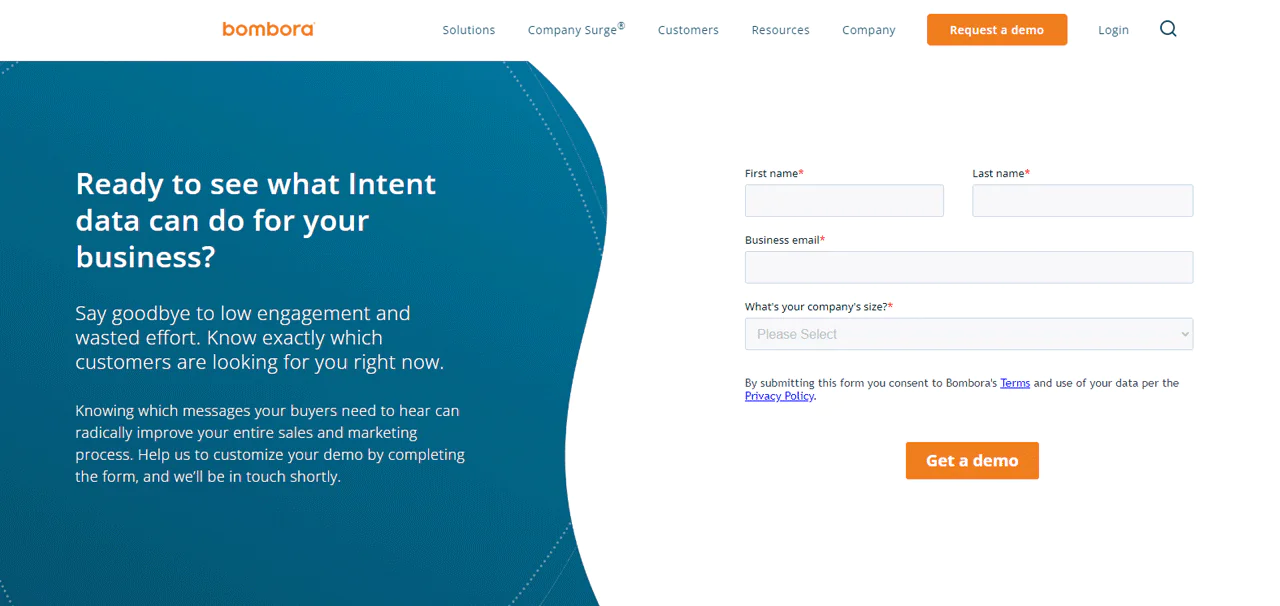
What Users Say About Bombora
- G2: 4.4 · 154 reviews
“The platform is incredibly intuitive and the user experience is easy to use. My favorite part of the tool is the automatic surge report and net-new account to HubSpot. We come in each Monday with a new set of accounts actively shopping for our services and solutions can pull contacts from those intent companies to ensure our content is in front of them.
The Bombora and Hubspot integration is also incredibly robust. We can see a contact’s surge score, the # of topic they’re searching for, which topics, and if they’re surging on any clusters right off of the contact screen.” – Ashden K.
Our Review of Bombora
In our review of Bombora’s website, we noticed its strong focus on B2B intent data. The platform stands out with its unique data cooperative, gathering insights from over 5,000 B2B sites, which provides an in-depth look at buyer behavior.
Bombora’s Company Surge® Analytics, powered by advanced technology, taps into buyer interests, offering a deeper understanding of the market. We observed Bombora’s clear commitment to ethical data collection and privacy, ensuring responsible use of data.
Furthermore, we found that Bombora’s data can be easily integrated with existing B2B platforms, making it a perfect fit across marketing and sales.
3. Lusha
Lusha is specifically designed to improve intent data for finding contact lists and boosting conversion rates. This functionality helps in identifying potential clients actively seeking solutions, making Lusha even more effective for sales prospecting.
Besides, it offers a user-friendly Chrome extension to find data from LinkedIn. And it works well with Chrome, Firefox, and Edge browsers.
Plus, with a solid database for accurate and current information, Lusha is used by over 800,000 sales professionals and is trusted by major companies like Google, Amazon, Salesforce, and Apple
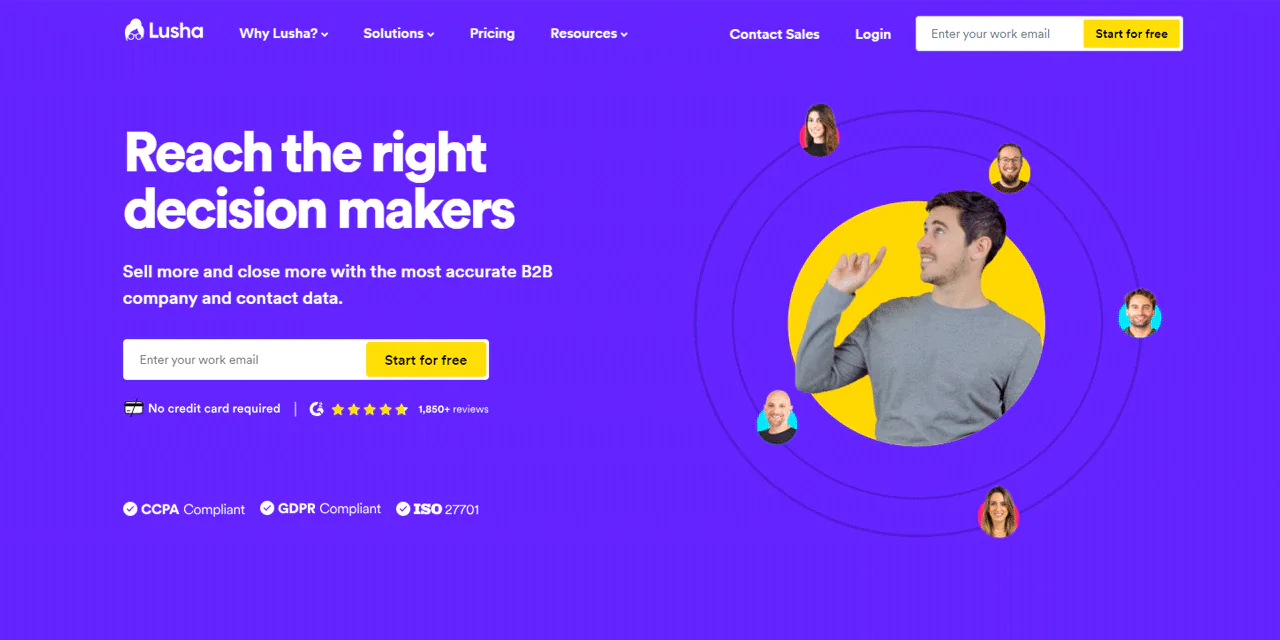
About Lusha
- Founding year: 2016
- Founding team: Assaf Eisenstein and Yoni Tserruya
- Company Size: 340 employees
Features of Lusha
Here are some of its standout features —
- Verified B2B Data: Lusha rigorously checks its data, providing you with trustworthy and accurate business profiles.
- Audience Definition Tools: It offers filters to help you easily identify businesses that fit your target market.
- Intent Data Providers List: Lusha keeps track of rising buying intent data and sales signals, helping you spot new business opportunities.
- Decision-Maker Identification: The platform assists in locating key contacts within a company, especially those in influential roles, and keeps track of any recent role changes.
- Direct Contact Data: Lusha gives you direct and verified contact information, making it easier to reach out to potential leads or partners.
- Dynamic Data Updates: The data on Lusha is regularly updated, ensuring you always have the latest and most relevant information for your business.
- Compliance with GDPR & CCPA: Lusha maintains important privacy regulations like GDPR and CCPA, promising that the data you use is responsibly obtained and legally sound.
Pros
- Access to accurate and verified business profiles.
- Easy identification of target markets with specific filters.
- Keeps track of current market opportunities effectively.
- Simplifies finding key decision-makers in organizations.
- Provides direct and reliable contact information.
- Regularly updated data ensures relevance and accuracy.
Cons
- May be less effective outside B2B contexts.
Pricing
As a newcomer, you can benefit from the free package, granting 5 credits without any charges. If you’re working alone and have a more advanced experience, the Advanced package at $39 per user per month is a good option. It provides 40 credits for you.
Now, if you’re operating with a small team and seeking a comprehensive solution, opt for the Elite package at $69. It comes with 80 credits and 25 contacts of bulk prospecting.
Finally for big companies, Lusha offers custom solutions. In this case, you’re encouraged to get in touch with Lusha directly.
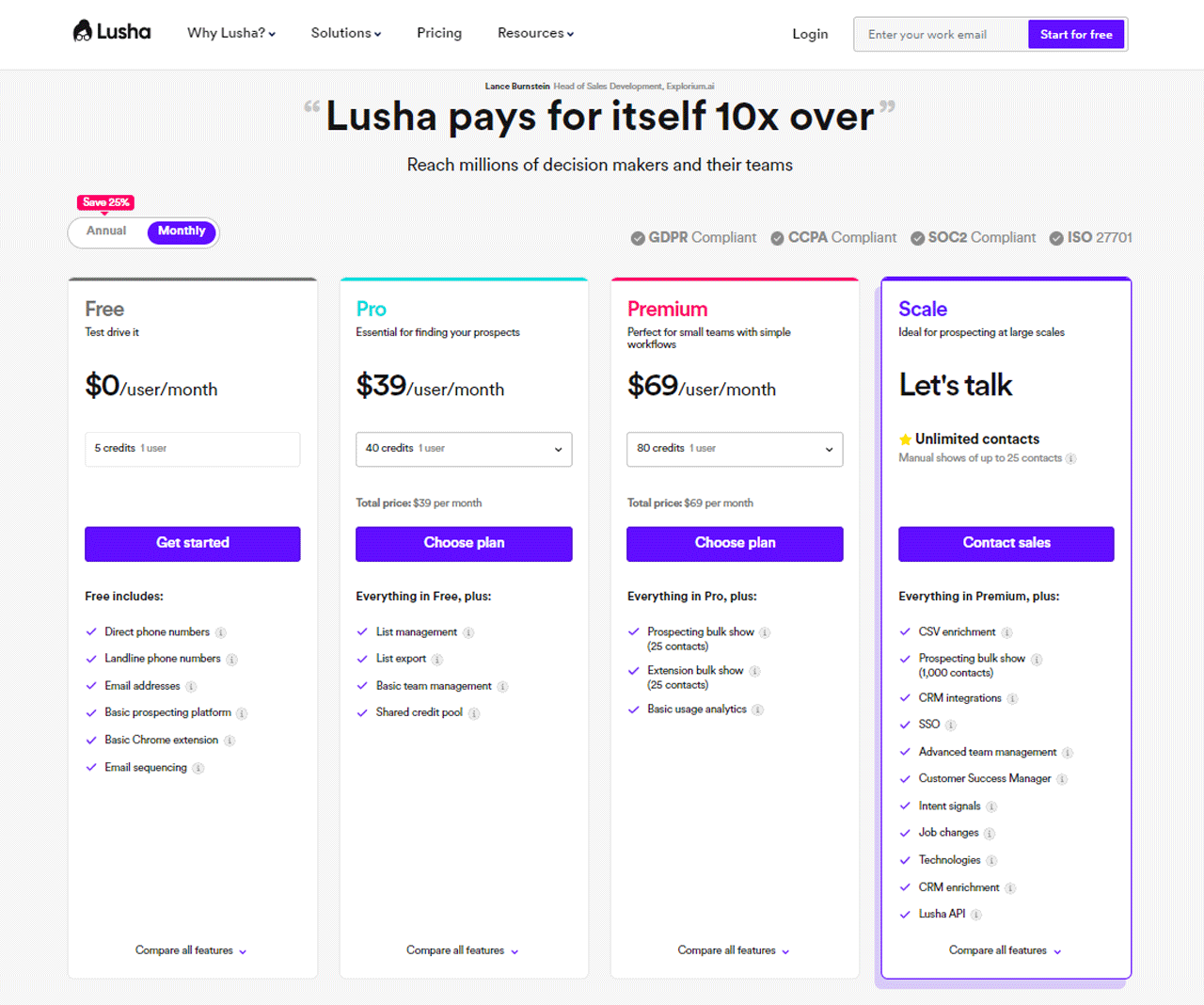
What Users Say About Lusha
- G2: 4.3 · 1,427 reviews
“It provides accurate information and has a very high ease of implementation. And there are so many features useful for business.” – Manjinder S.
- Capterra: 4.1 · 359 reviews
“Lusha is a straight forward solution that offers value for money. Compared to expensive competitors it does a fairly good job. Some of the data could be better however it is grate product for speeding up the time taken to find information and generate leads.” – Ben B.
Our Review of Lusha
During our review of Lusha, we discovered it to be an exceptionally effective tool for finding B2B intent data. When compared to similar tools, Lusha stands out for its accuracy and simplicity of use, making it a leading choice among B2B data providers.
A major highlight of Lusha is its ability to provide precise and up-to-date details on a wide range of businesses and professionals globally.
We found Lusha to be very user-friendly. It offers comprehensive contact information along with social media profiles, which are crucial for businesses aiming to enhance their sales and marketing strategies.
Notable features like ‘Intent’, which indicates a company’s potential for making purchases, and updates on job changes significantly contribute to targeted prospecting.
Read More About: Options instead of Lusha
4. ZoomInfo
ZoomInfo specializes in the B2B intelligence platform market primarily for its buyer intent feature.
It helps sales teams to identify prospects actively searching for topics related to their business. This key functionality positions ZoomInfo as a valuable tool for targeted prospecting, lead generation, and recruiting.
Beyond this standout feature, ZoomInfo combines advanced technology with a vast database to ensure extensive data coverage, accuracy, and depth.
Serving over 20,000 customers, ranging from small businesses to global enterprises, it helps these businesses effectively reach their ideal customers. The platform provides access to over 50 million direct dial phone numbers and millions of verified email addresses.
With its accurate and actionable insights, ZoomInfo is recognized as a leading go-to-market intelligence platform, tailored for B2B sales and marketing professionals. Its comprehensive approach to data makes it an invaluable asset in business growth and customer outreach.
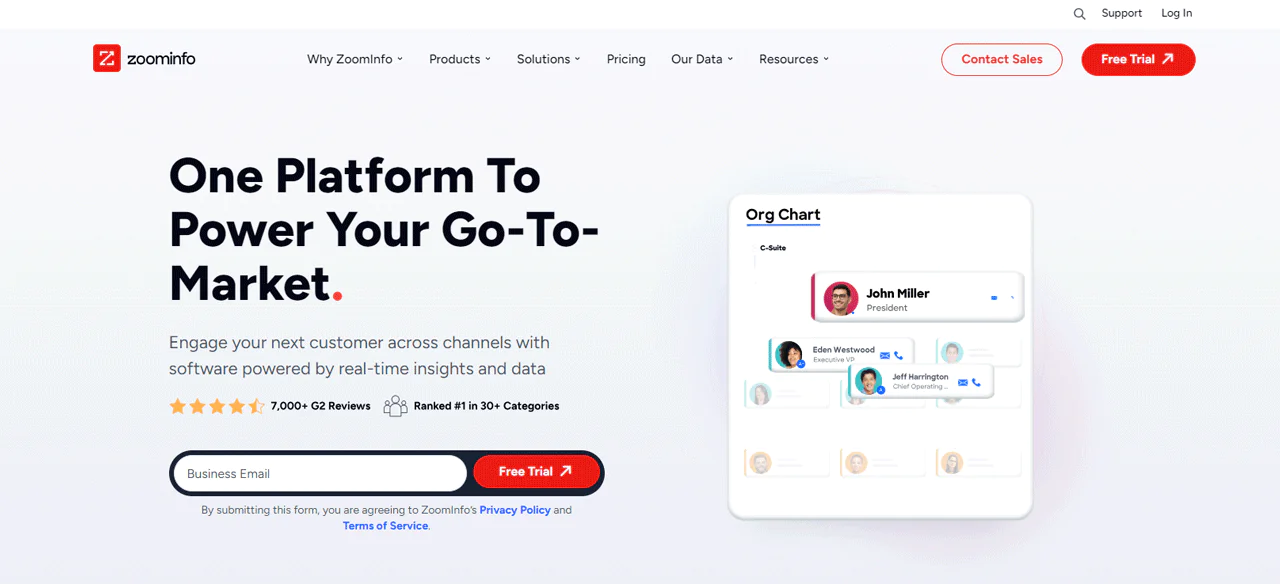
About ZoomInfo
- Founding Team: Henry Schuck
- Founding Year: 2007
- Company Size: 3,941 employees
Features of ZoomInfo
ZoomInfo is recognized as a leading provider in the B2B data landscape, offering a suite of features —
- Advanced Search Filters: ZoomInfo allows businesses to find the right leads by using detailed search options like job roles, company size, and industry.
- AI-Powered Prospecting Tools: The platform uses AI to automate the process of finding and improving contact data, making it more accurate and efficient.
- Real-Time Account Alerts: ZoomInfo sends updates about important changes in target companies. In turn, businesses can quickly adjust their B2B prospecting strategies.
- CRM Integration: The tool works well with common CRM and marketing systems, making it easy to move and use data in existing business processes.
- Intent Data Platforms: As a key player in intent data platforms, ZoomInfo identifies potential buyers by analyzing their online activities and interests.
- Comprehensive Company and Professional Information: ZoomInfo offers detailed, current information about companies and professionals, supporting better business decisions and planning.
Pros
- Buyer intent feature for sales-ready prospects
- Conversation Intelligence for sales call analysis
- Automated sales workflows based on buying signals
- Precise targeting with advanced search options.
- Timely updates on key account changes.
Cons
- Segmenting the leads is challenging
Pricing
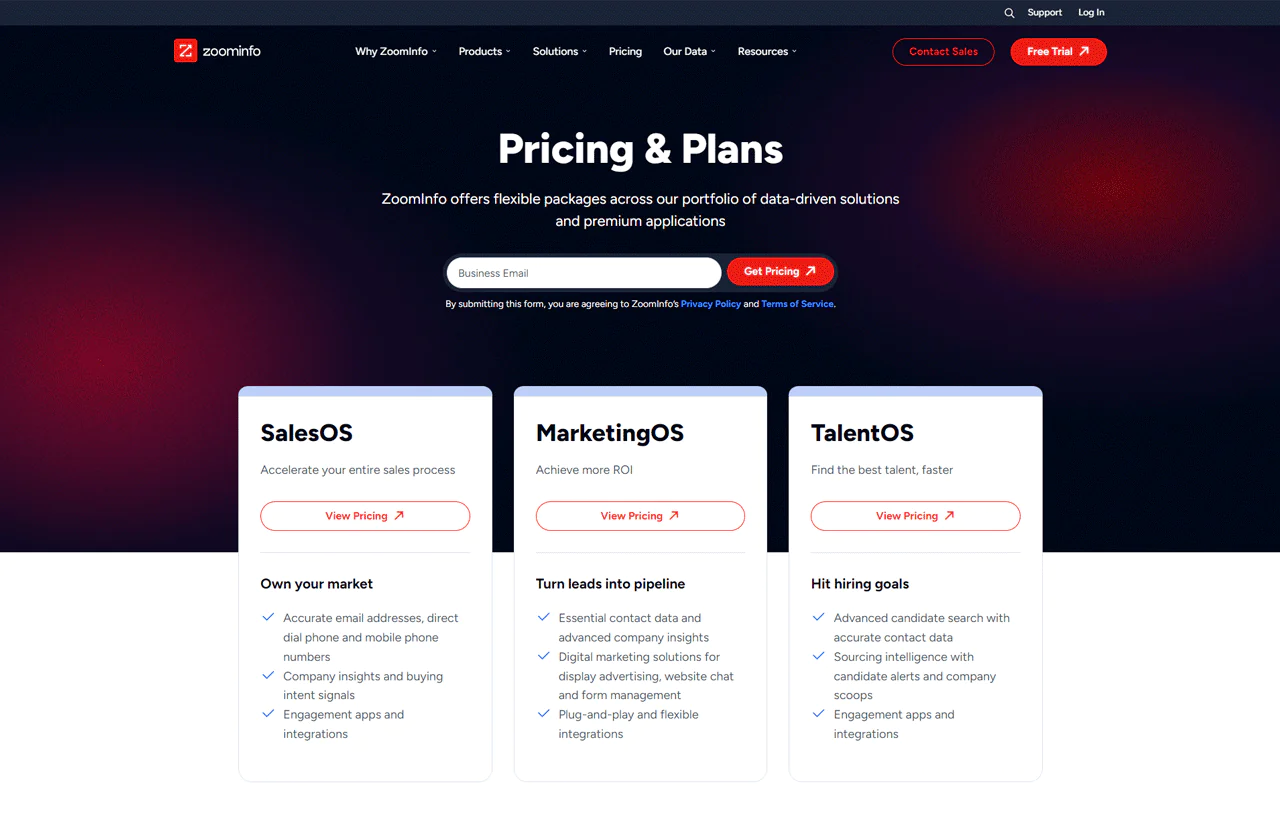
Though ZoomInfo offers quote-based pricing, we dig deeper to give you an idea of their pricing. From our extensive exploration, here’s a quick look at ZoomInfo’s pricing packages customized to your needs:
|
Packages |
Price |
Suitable For |
|
Pro+ (without intent data) |
$8,000 yearly |
Ideal for basic outreach |
|
Advanced+ (with intent data) |
$12,000 yearly |
Best for targeted marketing |
|
Elite Plan |
$41,000 yearly |
Comprehensive for larger teams |
What Users Say About ZoomInfo
- G2: 4.4 · 7,871 reviews
“Getting contact information immediately that integrates directly into our CRM. If I am on a webpage or LinkedIn I can use the ZoomInfo icon to get the information while I am on the page. WebSights has also been fun to use. We can see which companies have been on our website. We have actually converted several visitors to customers. Creating lists has been a game changer as well. Each week I receive an email with companies that are reseraching what our company provides. Really has been a wonderful tool!” – Shelane B.
- Capterra: 4.1 · 279 reviews
“Zoom is a great tool for prospecting. It helps bridge the gap from leads to new clients. I leverage it daily as I look to acquire new customers.” – Adam D.
Our Review of ZoomInfo
In our exploration of ZoomInfo, we found its significant role in B2B data, covering over 150 million contacts and 14 million companies. This vast pool of information is a boon for sales and marketing teams.
What distinguishes ZoomInfo is its intent data tools. These tools are adept at detecting signals that show when buyers are likely to make a purchase, enabling precise and timely targeting. Such a feature is vital for early identification and engagement with potential buyers.
Moreover, ZoomInfo provides AI-enhanced prospecting, seamless CRM integration, and detailed search functionality. Though we noticed that ZoomInfo might require some time and investment, its extensive data and powerful intent data capabilities set it apart.
5. Demandbase
Demandbase is a tool that helps sales and marketing teams work together on account-focused tasks. It provides tools for sales insights, account details, and advertising to strengthen your corporate marketing strategies.
As an intent data provider, Demandbase stands out with its unique approach to go-to-market intelligence designed for B2B sales and marketing professionals. The platform is designed to help you locate, prioritize, and measure the effectiveness of in-market accounts.
Due to its ability to deliver precise insights, Demandbase has become a vital tool for growing quality pipelines and increasing customer lifetime value.
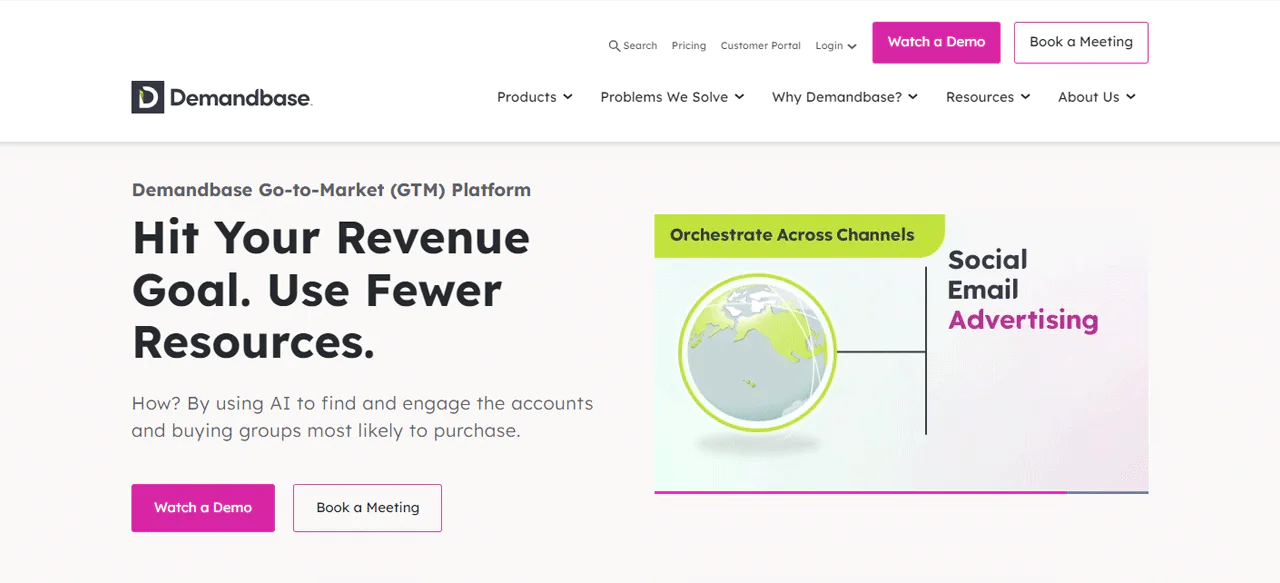
About Demandbase
- Founding year: 2006
- Founding team: Chris Golec
- Company Size: 940 employees
Features of Demandbase
Demandbase stands out in the B2B marketing industry thanks to its comprehensive features. Here are some of its key features —
- First-Party Data Integration: Demandbase brings together your sales and marketing information, like CRM and email data, for a full view of your customer interactions.
- Ethically-Sourced Third-Party Data: The platform adds external data to yours, giving a broader and more ethical perspective on your accounts.
- Predictive Models: Demandbase uses AI to sift through data, providing useful insights and advice to pinpoint the best business opportunities.
- Lead-to-Account Mapping: This tool links leads directly to the appropriate accounts, making your team’s work more targeted and efficient.
- Targeted Segmentation: You can create specific groups based on detailed factors, allowing for more focused marketing activities.
- Engagement Heat Maps: Demandbase identifies the most interested prospects, helping you concentrate your efforts where they’re most effective.
- Automated Data Cleansing and Enrichment: The platform regularly updates and improves your data, ensuring you always have the most current and accurate information.
Pros
- AI-driven insights for strategic decision-making.
- Efficient lead-to-account matching improves targeting.
- Precise segmentation for tailored marketing efforts.
- Engagement tracking focuses resources on active prospects.
- Continuous data accuracy through automated updates.
Cons
- There’s room for improvement in reporting
Pricing
You can choose from Professional, Enterprise, or Elite plans. However, you’ll need to contact them to find out the price.
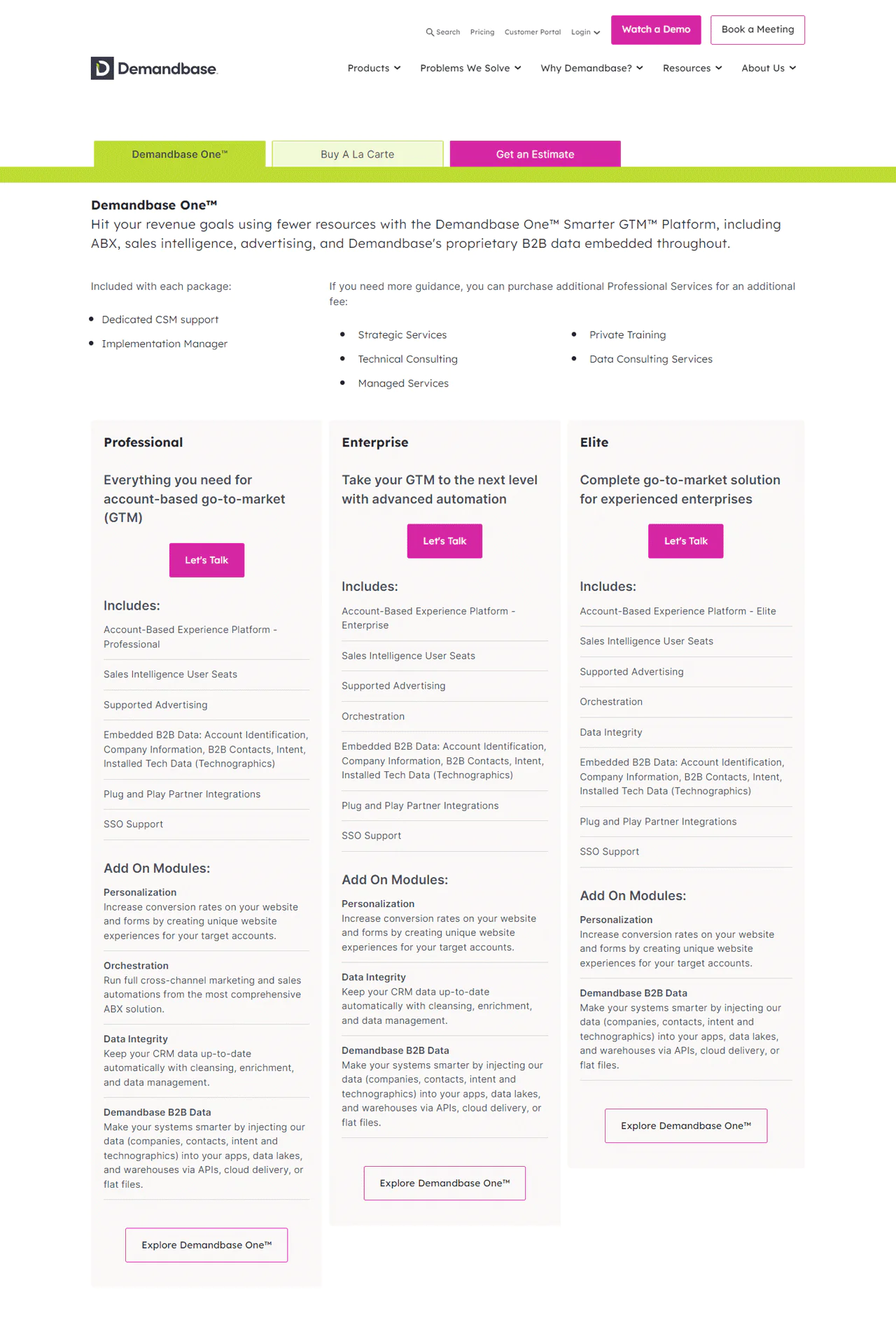
What Users Say About Demandbase
- G2: 4.3 · 1,555 reviews
“Demanbase One has make it easy for me to find, filter and analyzing buyer intent account that show interest on our service niche. We then collect and warm-up that account for targeted marketing campaigns. It is one of tools that we use daily.” – Jill W.
- Capterra: 4.3 · 16 reviews
‘There are so many insight about what companies are doing and how they are interacting with your site. The visibility is so helpful with my day to day.” – Lauren M.
Our Review of Demandbase
During our look at Demandbase, we noticed its focus on combining internal and external data, giving a detailed picture of B2B customer profiles. The platform’s AI-driven analysis that offers practical insights is a standout feature.
Demandbase is notable for its data matching and cleansing, which boosts the reliability and relevance of its Account Intelligence. Its ability to track customer journey stages and show which prospects are most engaged is key for focused marketing.
Based on our exploration, Demandbase’s commitment to ethical data practices and predictive analytics can help businesses become more competitive.
6. 6sense
6sense is a dynamic platform that focuses on B2B intent data to reveal hidden buying signals and interests. This feature is crucial for businesses as it helps in identifying potential clients who are actively researching related products or solutions.
Additionally, 6sense offers comprehensive insights into buyer journeys, enabling sales teams to prioritize accounts effectively. This makes it a powerful tool for businesses looking to utilize the power of data to drive growth and revenue.
Through its Property Intent Network, 6sense tracks and analyzes a wealth of data from millions of B2B web domains. This is important for understanding and predicting buying behaviors across various industries.
With its AI-powered scoring for accounts, leads, and contacts, 6sense offers actionable predictions, suggesting the next steps for sales teams.
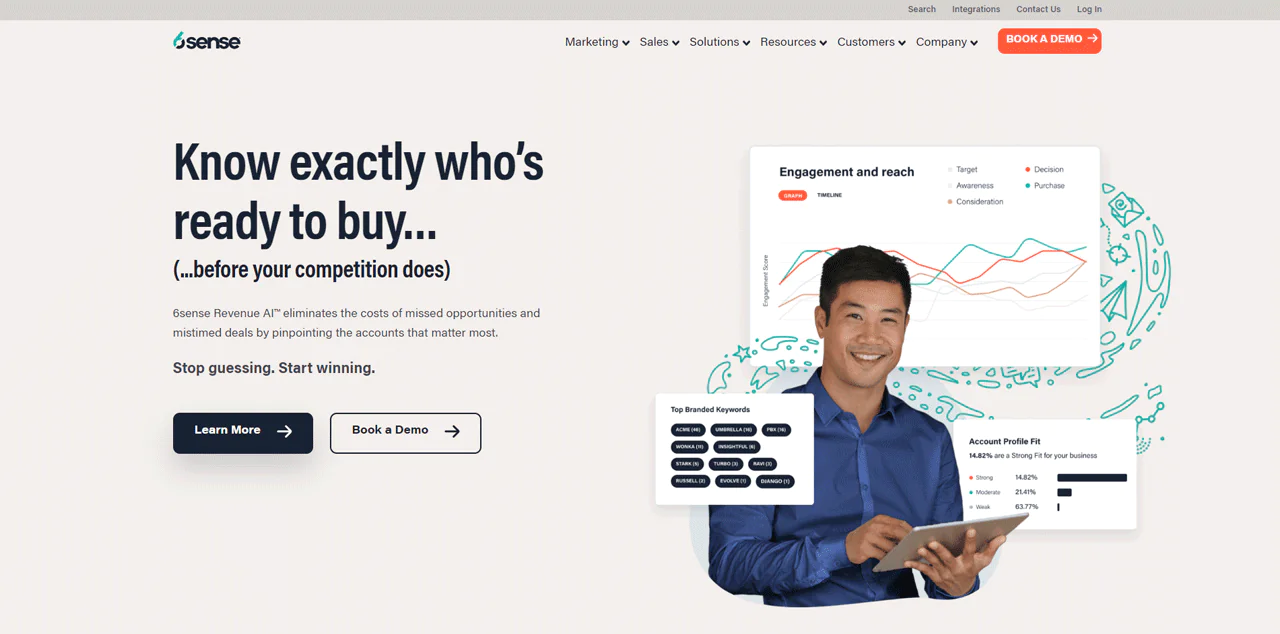
About 6sense
- Founding year: 2013
- Founding team: Premal Shah and Viral Bajaria
- Company Size: 1,000 Employees
Features of 6sense
6sense provides a wide range of marketing and sales features for B2B companies. Some of its key features —
- AI-Driven Predictive Analytics: 6sense uses AI to analyze market data and predict upcoming trends and customer actions. This helps businesses plan better for the future.
- Comprehensive Intent Data: The platform digs deep into buyer searches and interests. As a major player in intent data providers list, it helps businesses understand and meet market demands.
- Account-Based Marketing (ABM) Strategies: 6sense enhances ABM efforts by pinpointing and focusing on key accounts, leading to more effective marketing.
- Dynamic Segmentation: This allows companies to categorize their audience instantly based on different criteria, leading to more tailored marketing messages.
- Advanced Lead Scoring: 6sense employs AI to rank leads based on their conversion potential, helping sales teams focus on the most promising leads.
- Sales Intelligence: The platform provides insights that help sales teams customize their approach and concentrate on the most valuable prospects.
- Data Enrichment: 6sense improves existing customer data with extra information, giving a fuller picture of leads and market opportunities.
Pros
- Predicts market trends accurately with AI analytics.
- Deep insights into buyer intent for targeted marketing.
- Improves ABM campaigns by identifying key accounts.
- Enables real-time, dynamic audience segmentation.
- Prioritizes leads effectively with advanced scoring.
- Provides actionable sales insights for better outreach.
Cons
- Intent data visualization problems
Pricing
They provide a free brief demo for your convenience and then you can customize a plan based on your needs.
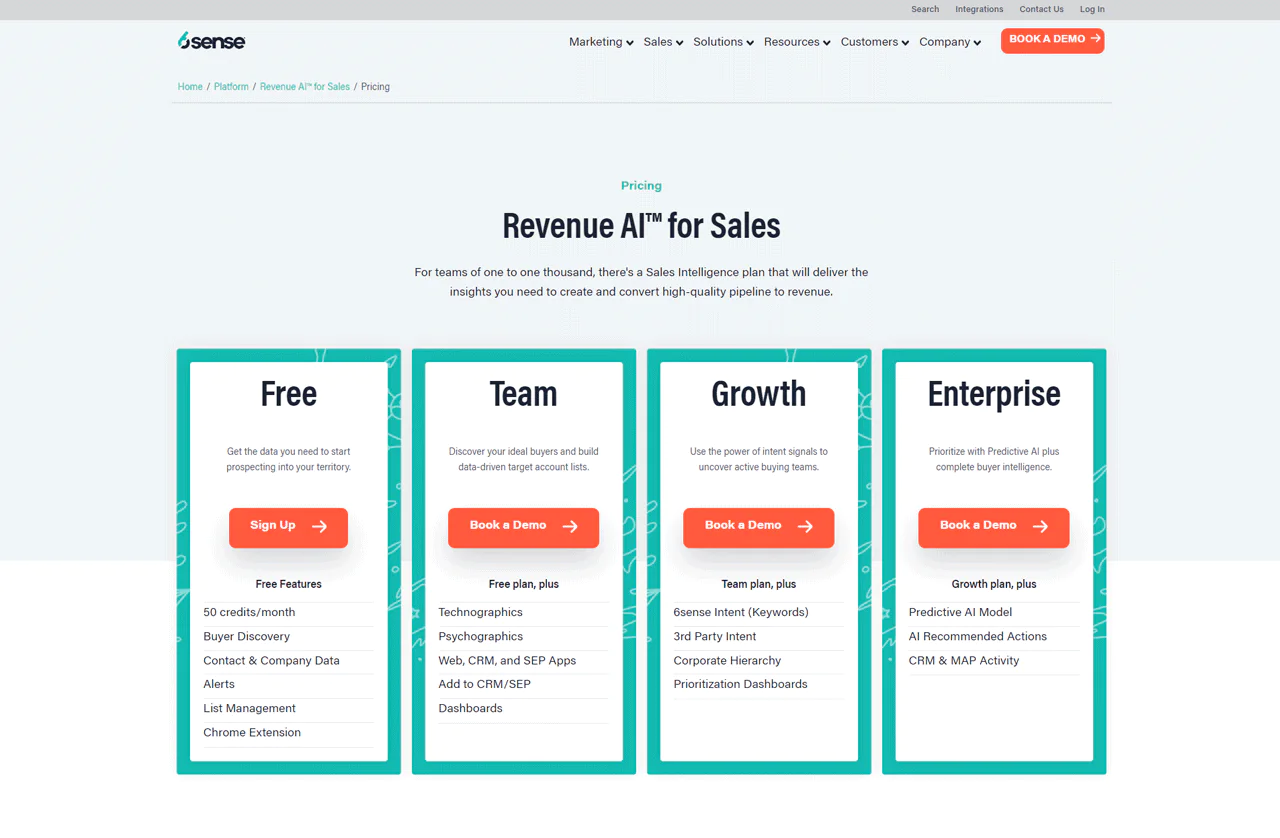
What Users Say About 6sense
- G2: 4.4 · 726 reviews
“The data uncovered by Revenue AI, along with the Sales Intelligence feature, is absolutely amazing for understanding how your marketing is actually doing. It takes so much of the guess-work out of revenue attribution, and helps facilitate a more harmonious Sales<>Marketing alignment (which is critial when running a multi-threaded ABM approach).
I could not recommend this feature enough.” – Katya Z.
- Capterra: 4.7 · 20 reviews
“The 6Sense platform provides a foundation for an account based marketing program and is a perfect platform for sales + marketing ABX/ABM. The ability to prioritize target accounts based on intent signals is key to making your sales and marketing efforts resonate with the right accounts, at the right time.” – Jaimie B.
Our Review of 6sense
During our look at 6sense, we noticed its strong focus on B2B marketing and sales. The platform shines with its AI-based analytics, giving detailed insights into market trends and customer behaviors.
6sense is particularly good at finding unseen demand and buyer intentions, making it a key player among intent data platforms. Its real-time intelligence for marketing and sales is noteworthy. We also saw that 6sense improves user experience by enriching data and integrating smoothly with existing CRM systems.
With its focus on predictive analytics and intent data, 6sense is a valuable tool for businesses looking to refine their market strategies.
7. DemandScience
DemandScience is a leading company in the B2B generation sector, focusing on improving marketing and sales strategies. At the heart of its services is the Live Data Factory.
This facility uses advanced technology to provide businesses with precise intent data, enriched with important intent signals. By focusing on intent data, you can move customers from their first interest to their final purchase.
With its presence in seven countries, DemandScience extends its impact and effectiveness globally. The company offers a range of solutions like PureABM, PureSyndication, and PurePush.
It uses intent data to quickly find and connect with the right potential customers at different stages of the sales process.
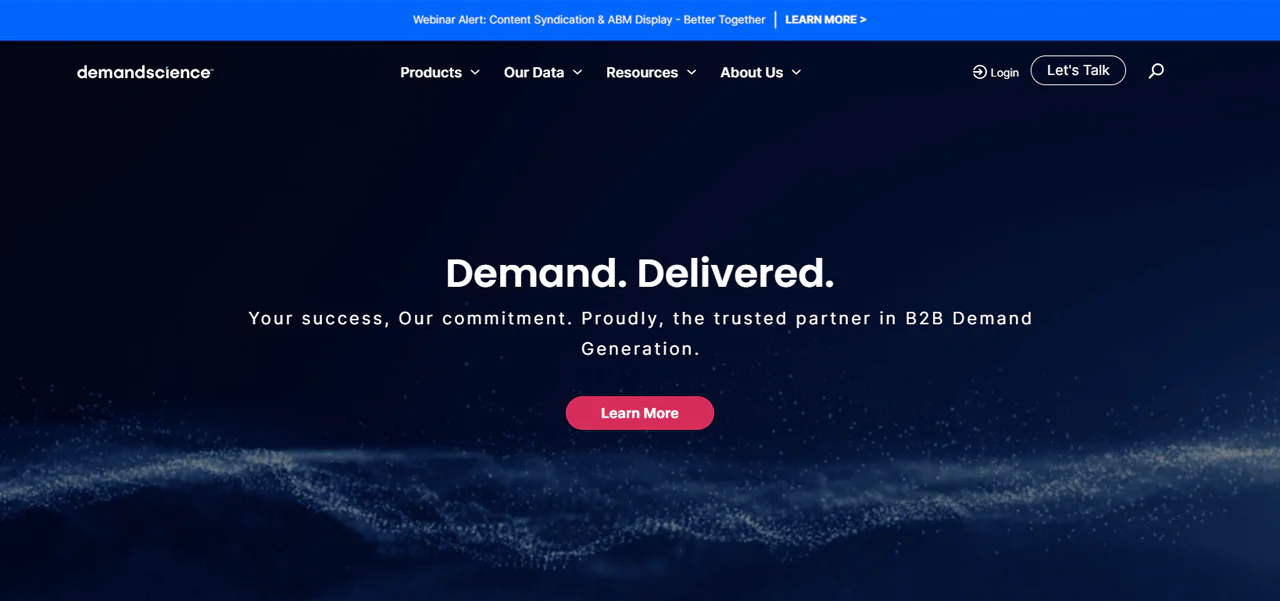
About DemandScience
- Founding year: 2012
- Founding team: Melissa Chang and Barry Harrigan
- Company Size: 600 employees
Features of DemandScience
Some of its notable features are —
- First-Party Data Collection: DemandScience gathers information from its own marketing efforts, giving insights from direct customer interactions. This approach leads to a database that’s both accurate and relevant.
- Third-Party Data Integration: The platform combines data from different external sources, providing a fuller picture of the market and adding depth to the available data.
- Intent Signals Tracking: DemandScience monitors a wide array of intent topics, totaling over 7,000, to grasp potential buyers’ interests. This is key for spotting market trends and understanding what buyers want.
- Data Enrichment: The platform updates contact details regularly, ensuring they’re correct and current. It’s vital for successful marketing and sales activities.
- Machine Learning Classifications: DemandScience uses AI to sort and standardize data, making it easier for businesses to use and understand.
- Confirmed Connect Technology: This feature checks and confirms every email record for trustworthiness and precision.
- Continuous Data Updates: DemandScience frequently refreshes its data, keeping the database complete and aligned with the latest market trends.
Pros
- Accurate data from direct marketing campaign engagements.
- Wide market view with third-party data integration.
- Tracks a wide range of buyer intent topics.
- Regularly updated and enriched contact records.
- AI-driven data organization for ease of use.
Cons
- Intent data delays due to minor issues
Pricing
You can get it upon request.
What Users Say About DemandScience
- G2: 4.4 · 191 reviews
“The team at Demand Science is very involved in the programs they run with us. They are always helpful and walk me through each step of the process in getting our content syndication up running. I appreciate that they genuniely care about the success of the programs and provided great advice on nurturing leads.” – Ciera C.
- Capterra: 4.2 · 32 reviews
“PureB2B has been a great lead-gen vehicle consistently providing us with quality leads that fit our target market. Their team is extremely knowledgeable and they seamlessly integrate with our marketing automation software making lead delivery a breeze.” – Francois N.
Our Review of DemandScience
While exploring DemandScience, we noticed its strong focus on B2B marketing and data management. In addition to gathering a wide range of data, the platform also incorporates data from external sources. This approach offers a comprehensive view of the market.
DemandScience tracks an extensive list of over 7,000 intent topics, highlighting its dedication to deeply understanding what buyers are looking for.
We observed their consistent work in keeping data accurate and up-to-date. In our exploration, DemandScience excels at providing insightful, data-driven advice.
Its ability to provide current and relevant B2B data makes it an essential resource for sales and marketing professionals.
8. Dealfront
Dealfront, born from the union of Leadfeeder and Echobot, improves sales and marketing efforts. It excels in providing in-depth B2B data, particularly for the European market, and ensures compliance with GDPR standards.
The platform’s primary role is to monitor website visitors and convert them into promising sales leads. Besides, Dealfront’s tools are user-friendly and effective. They assist in comprehending sales prospects, pinpointing website visitors, and improving data quality.
Thus, you can stay informed about important events and news with Dealfront, which uses AI and machine learning.
One of Dealfront’s standout features is its thorough approach to data collection. It sources data from official trade registers and public records, as well as comprehensive financial data.
It’s especially useful for identifying key decision-makers and connecting with them.
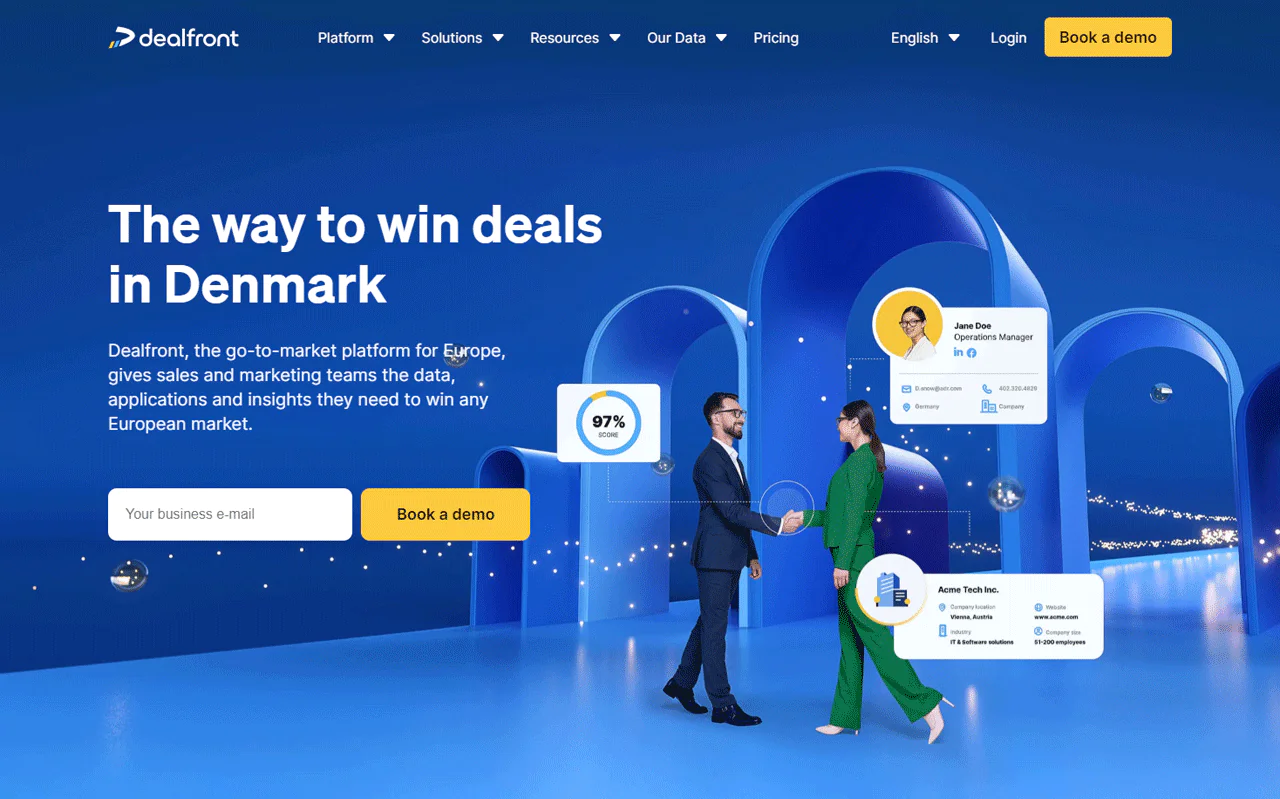
About Dealfront
- Founding year: 2012
- Founding team: Melissa Chang and Barry Harrigan
- Company Size: 600 employees
Features of Dealfront
Some of its most important features are as follows —
- Lead Generation Tool: Dealfront’s system is designed to pinpoint promising leads and establish connections with sales-ready contacts, in line with B2B data guidelines.
- Website Visitor Tracking: This feature identifies unknown companies visiting your website and transforms them into potential leads for your CRM system.
- Combined Data Sources: Dealfront blends information from its direct marketing efforts with data from other sources, offering a more comprehensive market overview.
- Company Event and News Tracking: This service keeps an eye on significant happenings and updates related to companies, providing valuable information for sales and marketing strategies.
- Website Traffic and IP Analysis: Dealfront scrutinizes the activities of companies on your site, helping in understanding their specific interests.
- Detailed European Company Data: Specializing in the European market, Dealfront delivers thorough data on numerous companies and contacts across Europe.
- Commitment to GDPR and Data Standards: Dealfront is dedicated to complying with GDPR, ensuring its data handling adheres to the highest standards of European data protection.
Pros
- Precise tracking of potential leads from website visits.
- Broad market understanding using diverse data.
- Regular updates on important company developments.
- Detailed website visitor behavior analysis for strategy.
- Large collection of data on European businesses.
Cons
- Limited focus outside of Europe.
Pricing
Dealfront offers customized pricing plans based on individual business requirements. Their approach involves starting with a foundational price, with the option to include additional features depending on your specific needs.
For detailed pricing information that matches your unique situation, it’s recommended to contact them directly.
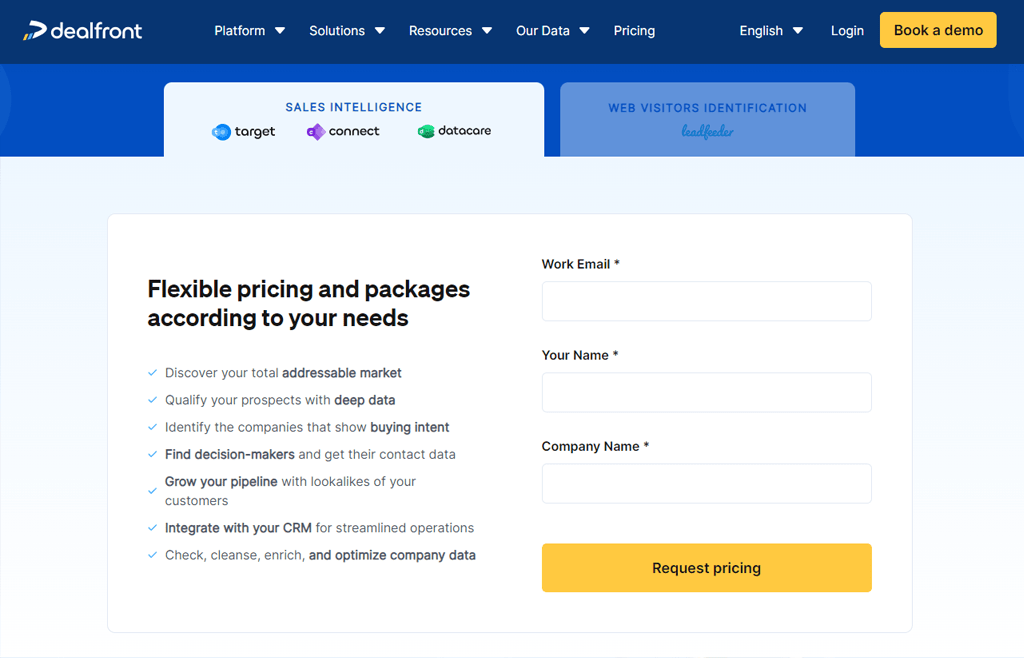
What Users Say About Dealfront
- G2: 4.3 · 770 reviews
“We’re able to customize our feeds to allow a focus on our target markets.” – Pam J.
- Capterra: 4.3 · 129 reviews
“The ease of use. This program is very intuitive to use. Additionally I like how robust the custom feeds feature is. I can set up any number of feeds from repeat visitors to how they actually came to our website (google cpc, bing cpc, organic, etc.)” – Robert E.
Our Review of Dealfront
During our review of Dealfront, we found its approach to business-to-business (B2B) data and sales intelligence quite impressive. Dealfront, which combines the features of Leadfeeder and Echobot, stands out as a well-rounded option for those in sales and marketing.
Our particular interest is in the detailed and reliable B2B data, specifically geared towards the European market and GDPR compliance. Dealfront excels in spotting potential leads from website traffic and effectively nurturing them into sales prospects.
Moreover, it provided us with a thorough insight into these businesses by keeping track of a wide range of company events. The platform’s ever-updating, extensive database of European companies really stood out to us.
9. Lead Onion
Lead Onion is a tool that transforms how sales and marketing are done. It uses 17 different sources of Intent data and a detailed B2B Contact Database to help users find and connect with the right prospects quickly.
The platform is known for its up-to-date, compliant data on B2B buyer intentions. It makes creating and sorting lead lists to fit specific buyer profiles easy and stress-free. Lead Onion also brings advanced lead intelligence and AI-driven tools for sales outreach, making campaigns more effective.
With Lead Onion, you can save time on manual research, get better response rates, and boost campaign success. This makes it an essential tool for small and medium businesses, marketing agencies, and recruitment firms.
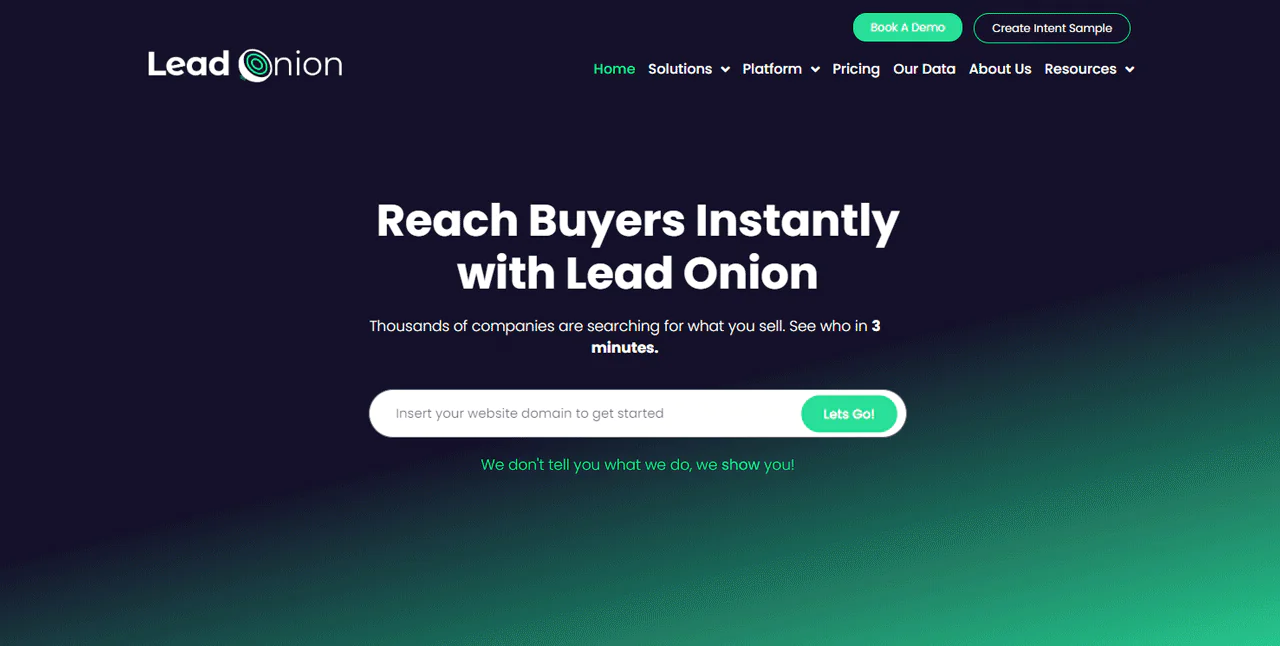
About Lead Onion
- Founding year: 2020
- Founding team: Michael Carlin
- Company Size: 11 to 50 employees
Features of Lead Onion
Following are the major features of Lead Onion —
- 18 Sources of Buyer Insights: Lead Onion gathers data from 18 varied sources, offering a wide view of what buyers are interested in.
- Comprehensive Intent Data: The platform merges data from direct interactions and external studies, giving a fuller picture of what buyers want.
- Regulation-Compliant Contact Information: Lead Onion ensures all its contact data meets GDPR and global data standards, making it both safe and reliable.
- Monitoring Content Engagement: The service tracks engagement across a wide array of content, providing insights into what captures your audience’s attention.
- Direct Contact Access: Lead Onion offers direct phone and email details, simplifying the process of contacting key decision-makers.
- Targeted List Creation: Utilizing specific company tech and demographic data, the platform helps in crafting precisely targeted marketing lists.
- Identifying Active Buyers: Lead Onion pinpoints companies currently in the market to buy, focusing your efforts on the most viable leads.
Pros
- Real-time messaging enhances instant communication.
- Comprehensive task management system.
- In-depth monitoring of content interactions for better audience understanding.
- Targeted marketing using detailed company and demographic data.
- Quickly identifies businesses looking to buy.
Cons
- Mainly suitable for B2B, less so for other areas.
Pricing
Lead Onion’s pricing is designed to match your specific requirements and budget. They offer plans suitable for different business sizes. The ‘Basic’ option costs £800 per month and gives you access to over 90 million B2B contacts and 6,000 credits annually.
If you need more, the ‘Advanced’ plan at £1,200 monthly includes 50x more intent topics and 12,000 credits. For the most in-depth service, the ‘Ultimate’ plan at £1,700 monthly offers the fullest range, including competitor analysis and 20,000 credits.
With Lead Onion, you’re charged only for the leads you actively choose, making it an efficient choice for your B2B lead generation strategy.
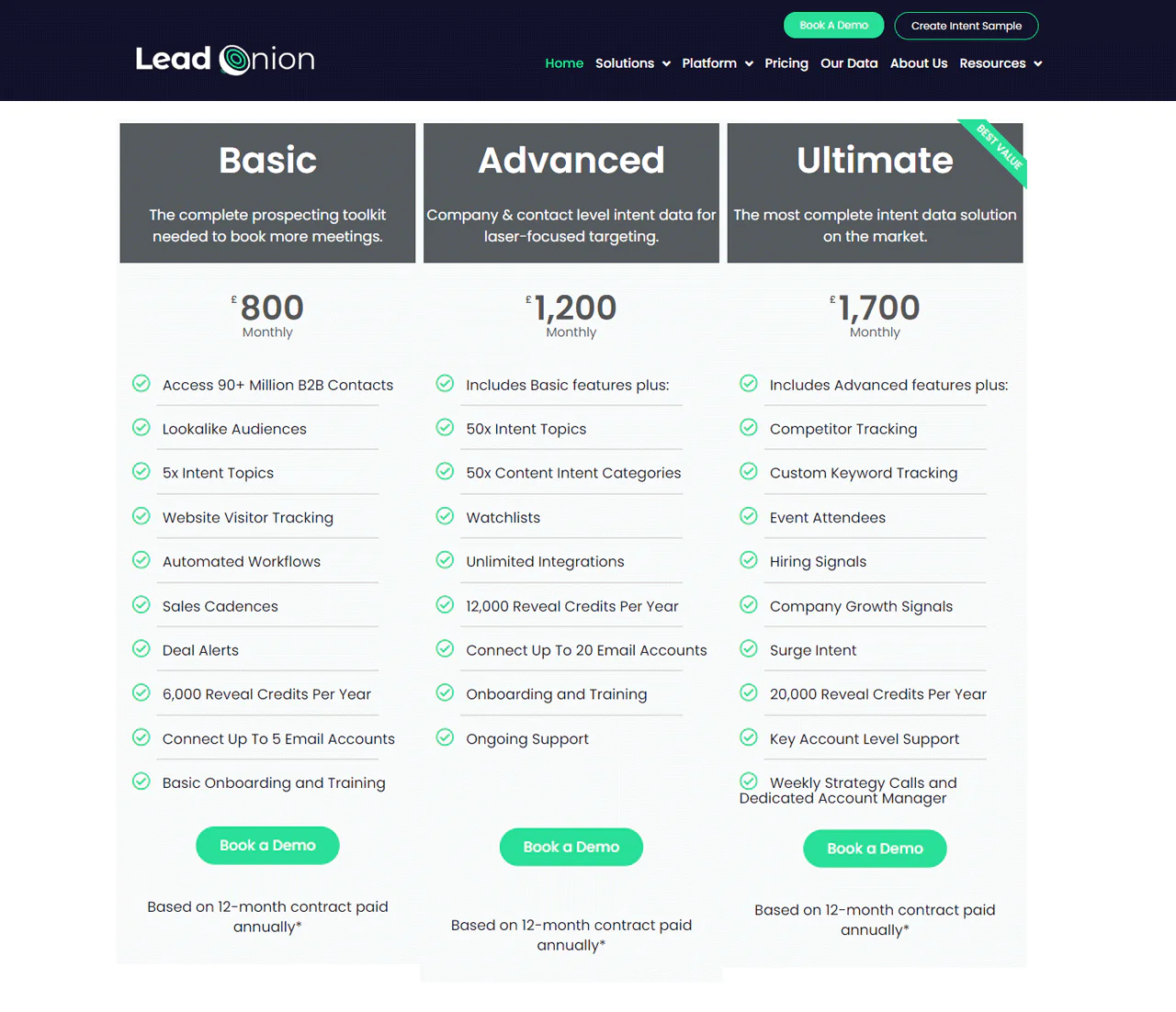
What Users Say About Lead Onion
- G2: 4.3 · 22 reviews
“Lead Onion is a great marketing and sales tool. It combines what every Marketing person wants to see with the kind of that every Sales person wants to get.
It’s the first tool I access every morning. The implementation took no time at all and they helped us with all the integration and support we needed.” – Brunna T.
Our Review of Lead Onion
In our review of Lead Onion, we discovered it’s an effective lead generation tool that combines sales engagement with a comprehensive B2B contact database.
Its main strength lies in quickly identifying companies that are ready for sales interactions. With 18 different sources for intent data, Lead Onion offers a rich and varied insight into buyer interests, streamlining the lead-finding process and reducing manual research.
The platform applies AI-driven outreach and automated processes to enhance interactions and successful conversions. It provides practical solutions for small to medium businesses and agencies, particularly in sales, marketing, and recruitment.
10. Terminus
With over 200 million business professionals in its database, Terminus stands out as a leading account-based marketing software. It’s achieved using both proprietary and cookie data.
Terminus not only focuses on accounts but also offers insights into engagement, funnel progression, and media spending. It smoothly integrates with Salesforce CRM, allowing for a more simplified advertising experience for each account.
What makes Terminus unique is its ability to pinpoint the exact individuals associated with a particular brand or business. It then reaches out to these individuals across various platforms, including web, mobile, and social.
As a result, persona-based campaigns deliver the right messages.
Moreover, Terminus Cloud for ABM provides users with the ability to design, implement, and scale an account-based marketing solution.
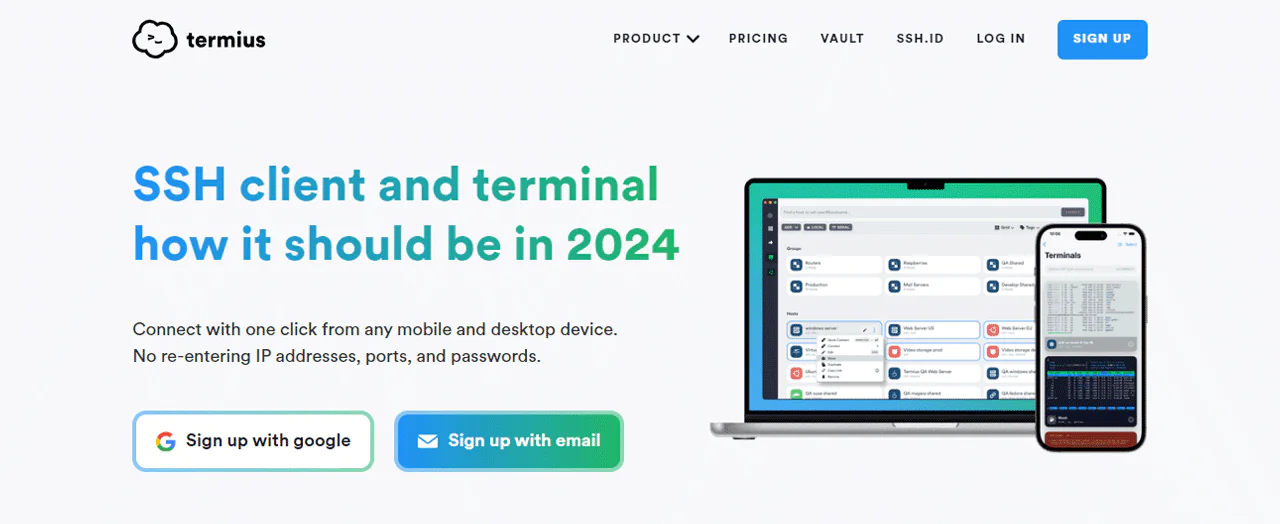
About Terminus
- Founding year: 2014
- Founding team: David Cummings, Eric Vass, Eric Spett, and Sangram Vajre
- Company Size: 201 to 500 employees
Features of Terminus
Terminus has the following significant features —
- Unified Strategy for Market Success: Terminus enhances teamwork across sales, marketing, and operations, combining and improving data for smarter strategies and decisions.
- All-Around Multi-Channel Approach: This feature ensures a full, varied approach to engage your key accounts effectively and on time.
- Comprehensive Reporting: Terminus merges different data types to give you a clear picture of your program’s performance, helping you make informed choices.
- Identifying Active Buyers: The platform spots accounts looking to buy, both new and existing in your CRM, helping you focus your marketing.
- Effective B2B Advertising: Terminus targets every member involved in the buying process, making sure your marketing budget is used wisely.
- Interactive Chat Features: The platform lets visitors on your website talk directly with your team, driving interaction and information sharing.
- Customizing Website Experiences: Terminus enables you to tailor visitor experiences on your website, improving engagement and the likelihood of conversion.
Pros
- Delivers a varied approach for engaging customers.
- Gives detailed, unified reports for better choices.
- Quickly finds and focuses on potential buyers.
- Makes B2B advertising more effective for reaching important buyers.
- Customizes website visits to increase user interaction.
Cons
- Mainly designed for B2B, not as effective for B2C.
Pricing
They offer a demo where they learn about your business and mechanism. And then, you can ask for a customized plan with pricing.
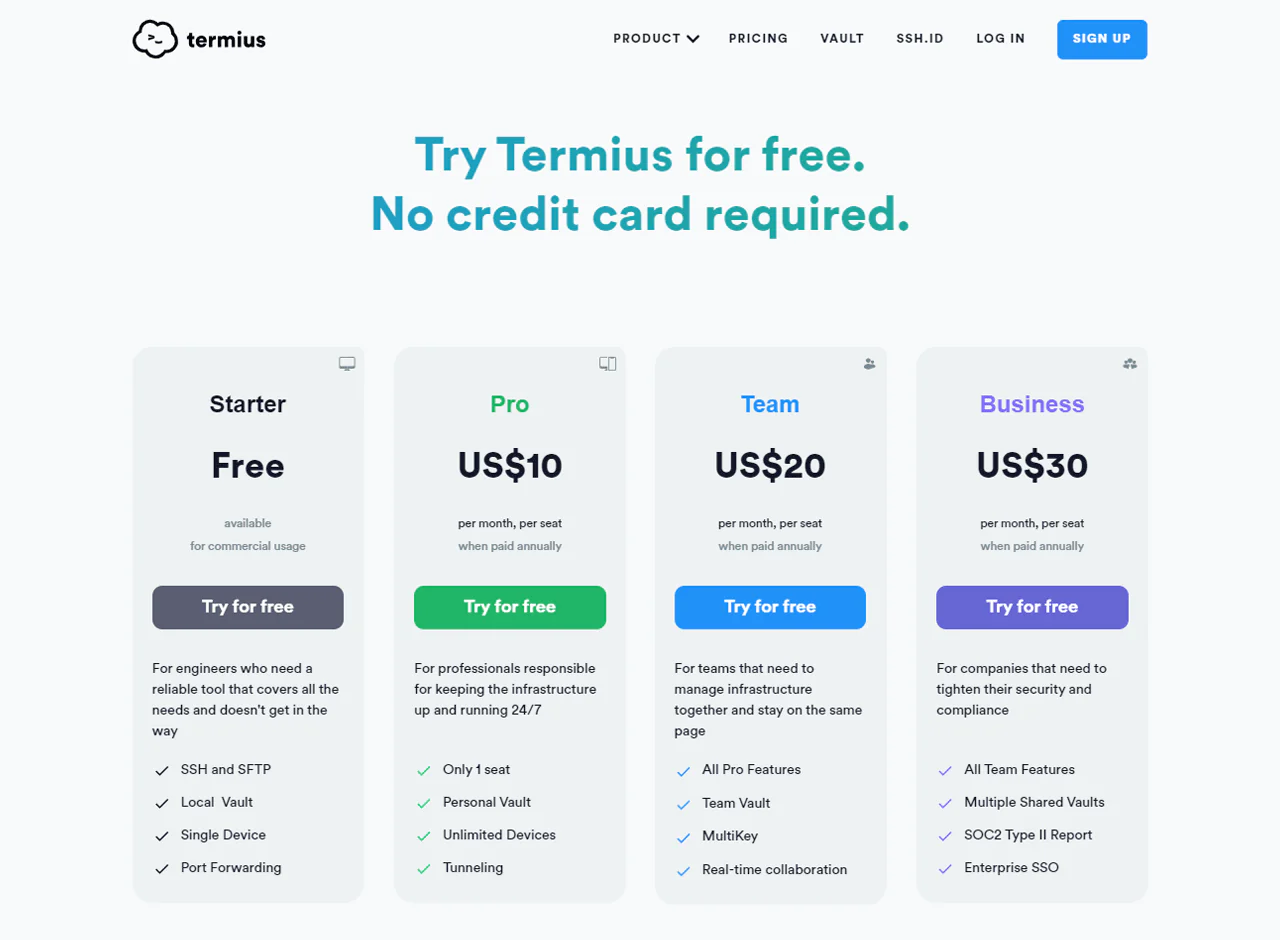
What Users Say About Terminus
- G2: 4.4 · 453 reviews
“Besides being user-friendly, easy-to-implement, loaded with exceptional features, easy-to-integrate with, this ABM tool is built to target clients/markets with military precision. Unlike any similar tool out there. It’s backed by outstanding user support too. An ABM tool that hunts and helps capture reliably.” – Cynthia C.
Our Review of Terminus
During our review of Terminus, we were impressed by its effectiveness in driving B2B growth and revenue. The platform smoothly integrates sales, marketing, and operations, using a variety of data to create a unified approach.
We were particularly impressed by its capability to offer a rich and diverse experience for key accounts. Terminus goes beyond the usual B2B methods by integrating intent data and comprehensive reporting, giving us a more profound market insight.
Clearly, Terminus focuses on developing personalized and relevant experiences for buyers. Using the platform, insights can be converted into practical strategies to increase revenue and pipeline.
Why Should You Use Intent Marketing Tools?
Intent marketing tools offer several advantages. They provide detailed insights about website visitors, such as company size, revenue, and industry, helping you understand your ideal customer and validate lead information.
These tools guide on how to approach potential customers, leading to benefits like:
Better Understanding Of Your Audience
You can get a clearer picture of who you’re targeting by looking at various details, like the company’s size, the technology they use, and personal demographics. This helps your team decide which leads to focus on and which ones might not be the right fit.
More Effective Campaigns
With detailed data, marketing campaigns can be more accurately designed to address the specific requirements of different customer segments. This precision leads to higher engagement and conversion rates.
Personal Touch
Sending messages that feel personal can make a big difference in B2B sales. When you address prospects by their name and role, and offer content that fits their current needs, they’re more likely to engage.
Better Customer Support
Intent data allows for a deeper understanding of customer behavior and preferences. This knowledge enables you to offer more personalized support, improving the overall customer experience and fostering loyalty.
What are the Intent Data Collection Methods?
Collecting intent data is all about understanding its types. Here’s a simpler breakdown —
First-Party Intent Data
Use your website’s analytics tools to track what visitors do, like form submissions. Plus, engage these visitors with ads or emails to turn their interest into sales.
This method is effective if they’re on your site looking for solutions you offer.
Third-Party Intent Data
When prospects are on other sites, you need data from external sources. Now, you can buy this data from third-party vendors who monitor various B2B sites and media publishers.
They track online activities and analyze how content is consumed over time. Look for spikes in topic searches, which signal strong buyer interest. These spikes, identified by algorithms, help you target prospects with relevant ads at the right time.
Important Pricing Facts to Consider While Choosing Best Intent Data Providers
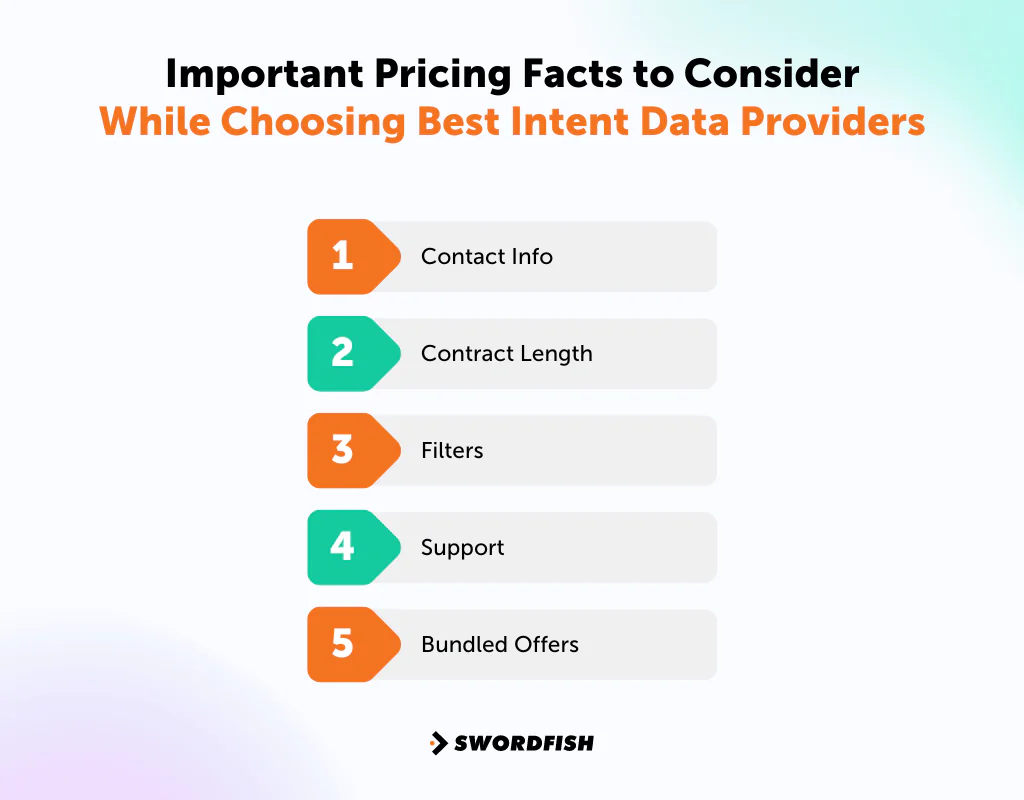
When it comes to pricing, it’s crucial to understand what you’re getting:
Contact Info
Some companies offer basic details like names and company contacts. Others provide direct contact info like emails and phone numbers. It’s important to know how accurate and relevant this information is.
If a company gets its data from multiple places, it might be more reliable.
Contract Length
Some companies want you to sign up for three years, others for just one year or even a few months. While technology and its effectiveness keep evolving, shorter contracts might seem less risky.
However, longer contracts might come with discounts.
Filters
If you’re new, you might get too much data. Good filters can help. Some tools let you set up profiles of your ideal customers and then filter the data to match. It’s also handy if you can easily move this data to your other marketing tools.
Support
Since intent data is still new, learning how to use it is key. Some tools are straightforward, while others might have a steeper learning curve. A good company will guide you from the start and offer strong support.
Bundled Offers
Some companies include intent data in a bigger software package. This means you’re paying for multiple features. It’s best to choose packages where you’ll use most of the tools.
A few tools can even be combined for more detailed results, like pairing intent data with tools that help identify potential buyers in a company.
How Do You Pick the Right Intent Data Software?
Choosing the right intent data software from so many options can be tricky. Here’s what to consider —
- Integration: Make sure the software works well with your existing marketing tools. This helps you use the data smoothly in your campaigns.
- Customization: Good software lets you filter and group data. This way, you can focus your campaigns on the right people.
- Reporting: Look for tools that offer clear analytics. This helps you see how well you’re doing and where you might need to change things up.
- Cost: Find software that fits your budget. Check what features it offers and its monthly price to see if it’s a good deal.
- Reviews: While reviews can’t tell you everything, they can give you a sense of how useful a tool is, its features, and the quality of its support.
Remember, understanding what intent data is can help you make a more informed choice. Always consider your business needs and what each tool offers.
What are the Common Features of Buyer Intent Data Providers?
Buyer intent data providers are helpful assistants for businesses, giving them insights into what potential customers might be interested in. This information is vital for shaping marketing and sales strategies.
Let’s break down their key features in an easy-to-understand way.
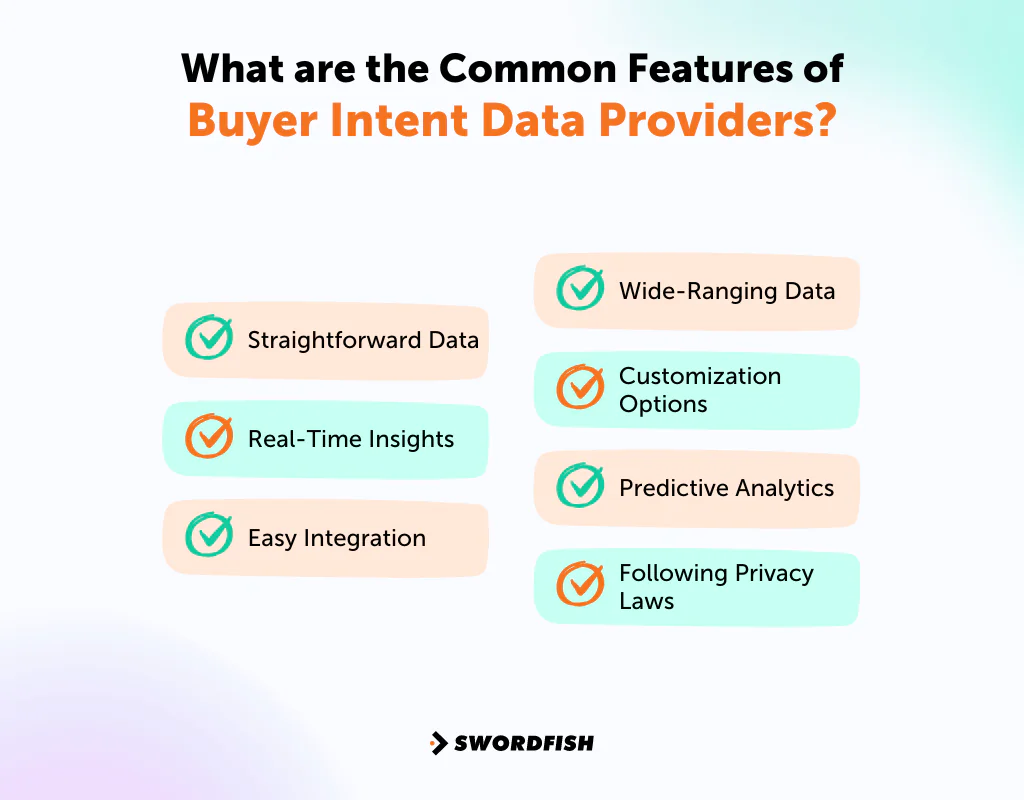
Straightforward Data
These providers offer data in a way that’s easy for everyone to understand, not just those who are experts in data. It means businesses can quickly figure out what their potential customers are looking for.
Real-Time Insights
They provide information that’s updated in real-time. In this way, businesses can stay on top of buyers’ trends and interests, thereby making relevant and timely decisions.
Easy Integration
Most of these providers make sure their data can be easily combined with other marketing and sales tools. It makes things more efficient by simplifying various business operations.
Wide-Ranging Data
They offer a wide range of data, covering different market trends and customer interests in various areas. This broad coverage helps businesses get a complete picture of the market.
Customization Options
These services often include options to customize the data according to the specific needs and goals of a business. With this customization, the data is more relevant and useful.
Predictive Analytics
Many providers use techniques to predict future market trends and customer behaviors. This foresight gives businesses an advantage in planning their strategies.
Following Privacy Laws
All of these providers are in compliance with the laws relating to data privacy. It means they make sure the data is collected and used in a way that’s legal and ethical.
Conclusion
As we’ve explored, intent data is making a significant mark in digital marketing. It’s clear that businesses can gain a deeper understanding of potential buyers by tapping into their online behaviors.
Plus, the varied ways B2B marketers use data, whether their own, external or a mix, highlight the value of intent data. This variety in data sources highlights its vital role in marketing strategies.
With the online world’s complexities, intent data providers stand out as essential partners. They provide not just data but also the tools businesses need to understand their customers better.
However, if you’re confused about which one to go for, go for Swordfish AI to collect intent data. You can use Bombora’s intent data to find companies willing to buy. Swordfish AI offers unparalleled accuracy, free trial, and depth in intent data collection.
So, try Swordfish today!
Frequently Asked Questions
Where do companies get data on intent?
Businesses learn about your preferences in several ways. They gather info from their websites, apps, and customer records. They can also get details by teaming up with other businesses. For instance, they might get an email list from a partner.
Lastly, some businesses buy data from outside sources. This data doesn’t show personal details but helps companies know what customers are looking for
What’s private intent data?
It’s information that shows when someone is looking online for a product or service, based on the websites and content they check out.
What’s a double data type?
It’s a type that can hold 64-bit decimal or floating-point numbers. It can store twice as much data as the float type. ‘Double’ is a standard data type.
Who sells the best intent data?
Choosing the best intent data provider really depends on what your business needs. Companies like Swordfish AI, Bombora, Lusha, and ZoomInfo all have different strengths.
Choosing the right one depends on how accurate their data is, how well they work with your other tools, and how much you can customize their services.

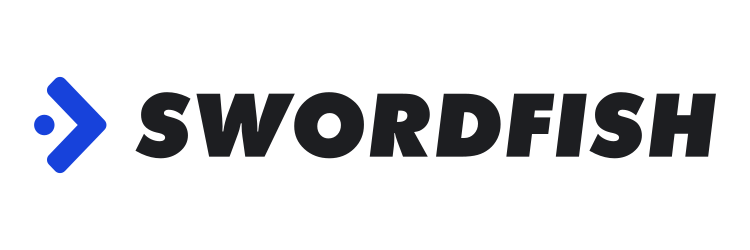
 View Products
View Products


